2017 Catalan independence referendum
The Catalan independence referendum of 2017, also known by the numeronym 1-O (for "1 October") in Spanish media, was an independence referendum held on 1 October 2017 in the Spanish autonomous community of Catalonia, passed by the Parliament of Catalonia as the Law on the Referendum on Self-determination of Catalonia and called by the Generalitat de Catalunya.[2][3][4] It was declared unconstitutional[5][6][7] on 7 September 2017 and suspended by the Constitutional Court of Spain after a request from the Spanish government, who declared it a breach of the Spanish Constitution.[8][9][10] Additionally, in early September the High Court of Justice of Catalonia had issued orders to the police to try to prevent it, including the detention of various persons responsible for its preparation.[11][12][13] Due to alleged irregularities during the voting process as well as to the use of force by the National Police Corps and Civil Guard, international observers invited by the Generalitat declared that the referendum failed to meet the minimum international standards for elections.[14][15][16]
| ||||||||||||||||||||||
| ||||||||||||||||||||||
| Location | Catalonia | |||||||||||||||||||||
|---|---|---|---|---|---|---|---|---|---|---|---|---|---|---|---|---|---|---|---|---|---|---|
| Results | ||||||||||||||||||||||
| ||||||||||||||||||||||
| Source: Government of Catalonia[1] | ||||||||||||||||||||||
The referendum was approved by the Catalan parliament in a session in which only nationalist parliamentarians participated on 6 September 2017 along with the Law of juridical transition and foundation of the Republic of Catalonia the following day 7 September, which stated that independence would be binding with a simple majority, without requiring a minimum turnout.[17][18] After being suspended, the law was finally declared void on 17 October,[19] being also unconstitutional according to the Statute of Autonomy of Catalonia which requires a two-thirds majority, 90 seats, in the Catalan parliament for any change to Catalonia's status.[20][21][22]
The referendum question, which voters answered with "Yes" or "No", was "Do you want Catalonia to become an independent state in the form of a republic?". The "Yes" side won, with 2,044,038 (92.01%) voting for independence and 177,547 (7.99%) voting against, on a turnout of 43.03%. The Catalan government estimated that up to 770,000 votes were not cast due to polling stations being closed off during the police crackdown,[1][23][24][25] although the "universal census" system introduced earlier in the day allowed electors to vote at any given polling station.[26][27] Catalan government officials have argued that the turnout would have been higher were it not for Spanish and Catalan police suppression of the vote.[28][29][30] On the other hand, many voters who did not support Catalan independence did not turn out,[31] as the constitutional political parties asked citizens not to participate in what they considered an illegal referendum.[32][33]
On the day of the referendum, the inaction of part of the autonomous police force of Catalonia, the Mossos d'Esquadra, allowed many polling stations to open. The Spanish National Police Corps and the Guardia Civil intervened and raided several polling stations after they opened.[34][35] 893 civilians and 111 agents of the National Police and the Guardia Civil were reported to have been injured.[35][36][37][38] According to various sources these previously reported figures may have been exaggerated.[39] According to the judge from Barcelona who is currently investigating the accusations of police violence, there were 218 persons injured on that day in the city of Barcelona alone, 20 of whom were agents.[40][41] According to the official final report by the Catalan Health Service (CatSalut) of the Generalitat 1066 civilians, 11 agents of the National Police and the Guardia Civil and 1 agent of the regional police, the Mossos d'Esquadra, were injured.[42] The United Nations High Commissioner for Human Rights, Zeid Ra'ad Al Hussein, urged the Spanish government to prove all acts of violence that took place to prevent the referendum.[43][44] The police action also received criticism from Amnesty International and Human Rights Watch which defined it as an "excessive and unnecessary use of force".[45][46] Spanish Supreme Court judge Pablo Llarena stated Puigdemont ignored the repeated warnings he received about the escalation of violence if the referendum was held.[47][48]
Mossos d'Esquadra are being investigated for disobedience, for allegedly not having complied with the orders of the High Court of Justice of Catalonia to prevent the referendum.[49] Including Josep Lluís Trapero Álvarez, the Mossos d'Esquadra major, who is being investigated for sedition by the Spanish National Court.[50] Mossos d'Esquadra deny those accusations and allege they obeyed the orders but applied the principle of proportionality, which is required by Spanish law in all police operations.[51]
Background
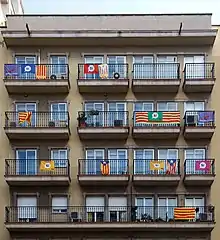
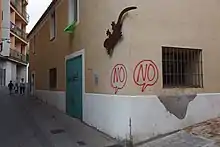
The ballot was initially scheduled for no later than 17 September 2017, a result of an election pledge made by pro-independence parties ahead of the 2015 Catalan election (during the previous legislature, the Catalan government had held a non-binding "citizen participation process" about the question).
The election resulted in a minority government for the Junts pel Sí coalition (JxSí), which had won a plurality of MPs (62 of the 135 seats), plus conditional support from the 10 CUP-CC MPs. Shortly after the government was formed, it resolved to hold a referendum on independence.[52][53][54][55]
.jpg.webp)
On 24 January 2017, the Government of Catalonia held a privately organised conference[56] in one of the rooms of the European Parliament in its Brussels headquarters. The event, entitled "The Catalan Referendum", was promoted by Carles Puigdemont, President, Oriol Junqueras, Vice President, and Raül Romeva. It was attended by 500 people, among whom were MEPs, diplomats and journalists from the international media.[57][58][59][60]
Organisation
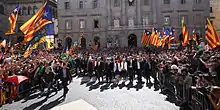
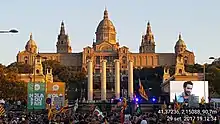
The Catalan government's decree officially calling the referendum was expected to be approved in the second half of August[61] but was approved only on 6 September.[62]
Shortly after the referendum was announced, attention focused on the issue of the ballot boxes, since the government of Spain is in charge of providing them, whereas for this non-state-sanctioned vote, the government of Catalonia would have to put them in place, potentially risking prosecution for the misuse of public funds. It is still unclear who bought them. The Catalan government opened a bidding process to buy them but no offers were presented. Cristóbal Montoro, the Spanish Minister of the Treasury, assured that the ballot boxes were not paid for with public money and some media reported they were finally bought by an individual whose identity remains unknown.[63][64]
Tendering by the Catalan government for materials such as ballot papers and envelopes for a putative regional election in the region were thought by some to be an attempt to covertly organise the referendum.[65][66][67] On 24 March, the Spanish Public Prosecutor's Office in Catalonia had already announced an inquiry to determine whether a referendum is in the planning.[68]
In terms of its organisation, the electoral roll is one of the main points in contention, since this is managed by the National Institute of Statistics, an autonomous organisation placed under the jurisdiction of the government of Spain. To access its data, polls must have been authorised by the Spanish Congress.[69] Without an undisputed access to the electoral roll, the results may be deemed unreliable. Similar difficulties could be met when it comes to the electoral commission to be formed for monitoring the polling and results.[69]
An official announcement by the government of Catalonia suggested that Catalan residents overseas willing to vote would have to register. By the end of June 2017, out of 285,000 Catalans living abroad and eligible to vote, 5,000 had registered.[70]
Tensions within the Catalan government
On 3 July 2017, President Puigdemont sacked his Minister for Enterprise, Jordi Baiget, who, in the face of the legal challenges, had just expressed doubts regarding the referendum taking place as envisioned by the Catalan government.[71]
Then, on 14 July, Puigdemont proceeded with a cabinet reshuffle, replacing three additional ministers in his cabinet (the ones responsible for presidency, education, and interior) in a move widely seen as a removal of the remaining hesitant voices within his cabinet in regards to the referendum issue.[72]
On 17 July, the chief of the Catalan police, called Mossos d'Esquadra, resigned without giving any reason. The Catalan police force is seen as key to enforcing any court orders sought by the central government challenging the secession vote.[73]
Additional isolated resignations and dismissals have been noted among some of the high-level civil servants potentially playing a role with the vote's organisation.[74][75][76][77][78]
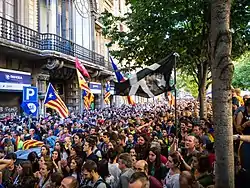
Scope
When the Spanish Constitutional Court suspended the law on the referendum on 7 September 2017, it forbade several Catalan office holders, the Catalan media, as well as the 948 municipalities of Catalonia to participate in the preparation of the referendum.[79] The municipalities were instructed to reply within 48 hours whether they intended to comply or not. Out of 726 municipalities that answered, 682 announced that they would support the referendum anyway, 41 announced they would refuse to support it, and three, including the municipality of Barcelona, answered without making their intentions clear.[80]
Among those that refused to support the referendum, however, there are large population centers,[82] such as the provincial capitals of Lleida (140,000 inhabitants) and Tarragona (130,000 inhabitants) or the cities of Terrassa (215,000 inhabitants) and Hospitalet de Llobregat (250,000 inhabitants) governed by PSC mayors. The mayor of Barcelona, Ada Colau, while refusing to make a statement whether the municipality of Barcelona would provide logistical support to the referendum or not, strongly criticised the "language of testosterone" and the pressure that she said was being exerted on the municipalities. Nevertheless, she announced that she would do anything possible to allow those in Barcelona who wished to vote to do so.[83]
Police operation to stop the referendum
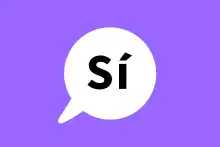
On 20 September 2017, following orders of the trial court number 13, the Spanish Civil Guard started Operation Anubis. During the first day, the police officers raided different headquarters of the Government of Catalonia and arrested 14 senior officials involved in the preparation of the referendum.[84] Simultaneously, several printing companies were searched for ballot papers and ballot boxes. Crowds gathered around the regional ministries to support the arrested staff and later on several pro-independence organisations, including the Catalan National Assembly (ANC) and Òmnium Cultural.[85] A crowd of more than 40,000 people heeded the call made by Òmnium Cultural and ANC and surrounded the Catalan economy department, preventing the exit of the Civil Guard agents.[86][87][88] Demonstrators vandalised three vehicles of the Civil Guard and their occupants were forced to flee into the Economy Department building, a court clerk remained trapped until midnight inside the building and had to flee by the roof, while several agents were trapped throughout the night as demonstrators shouted outside "You won't get out!".[89][90][91][92] The damages in the vehicles (3 Nissan Patrol) accounted for 135,632 €.[93] The Civil Guard agents cornered into the building made 6 calls for help to the autonomous police force of Catalonia, Mossos d'Esquadra, which were ignored. The first request for help was at 9:14 am with the subject: "Urgent - Request for support to Mossos".[87]
Both Mossos d'Esquadra Major Josep Lluís Trapero Álvarez and Barcelona Intendant Teresa Laplana Cocera were charged with sedition because of the role played by the regional police.[94] Trapero stated that the mossos weren't warned with enough time and that the demonstration was peaceful.[95] Two Catalan pro-independence leaders Jordi Sànchez and Jordi Cuixart (Assemblea Nacional Catalana and Òmnium Cultural, respectively) were sent to prison without bail by Spain's National Court. They are being investigated for alleged crimes of sedition for their role in organising these massive protests aimed at hindering the Civil Guard investigation.[96][97] On 20 September morning, Jordi Sànchez called for "peaceful resistance" to the police operation through social media.[85] The investigating judge stated that the leaders did not call for "peaceful demonstration but to the protection of Catalan officials through 'massive citizens' mobilisations"[97] and that Jordi Sànchez, on top of a vehicle, encouraged the demonstrators with expressions such as "no one goes home, it will be a long and intense night".[98] According to the judge the actions of Sànchez and Cruixat are into the scope of sedition, a felony regulated by the article 544 and subsequents of the Spanish Criminal Code:[86][99]
Conviction for sedition shall befall those who, without being included in the felony of rebellion, public and tumultuously rise up to prevent, by force or outside the legal channels, application of the laws, or any authority, official corporation or public officer from lawful exercise of the duties thereof or implementation of the resolutions thereof, or of administrative or judicial resolutions.
— Article 544 of the Spanish Criminal Code.[100]
A video uploaded to Twitter shows Cuixart y Sànchez on top of one of the vandalized Guardia civil cars on that night saying "Above all... We ask that you dissolve this demonstration, as best as you can, very calmly, today, in a few minutes". According to the source this happened around 11:00 pm and would contradict one of the arguments used by the investigating judge.[101] Amnesty International considered "pre-trial detention" excessive in this case and called for "immediate release" of Jordi Sànchez and Jordi Cuixart.[102]
In the following days, the Spanish Civil Guard and the Spanish National Police were reinforced with police officers from the rest of Spain, which are expected to reach 16,000 police and military police officers distributed in different Catalan cities on 1 October 2017 and would continue to carry out searches in companies that allegedly had referendum ballots or ballot boxes.[103] This would spark multiple protest demonstrations all across Catalonia, including cacerolazos during the night. Demonstrations "in defense of the right to decide of the Catalans" were held in several cities in Spain, though few people attended.[104] On the other hand, demonstrations were held throughout Spain in which thousands of people protested against the referendum[105][106][107] and the agents were acclaimed by the crowds in numerous cities of Spain when they left for Catalonia.[108][109][110]
A conference named Referendum yes or yes that was going to be held in Vitoria-Gasteiz on 15 September was forbidden by the courts after a request from the Spanish government. The speakers, including the pro-independence deputy Anna Gabriel, disobeyed the ruling and tried to hold the conference anyway, but the room where it was taking place was evicted by the police five minutes after starting.[111] One year later, the same court recognized there were no reasons to suspend the conference.[112]
In the days previous to the referendum, the Spanish civil guard shut down more than 140 websites following a court order issued by the High Court of Justice of Catalonia, including the official one from the Catalan government and the main site of the Catalan civil organization ANC.[113] That involved sending requests — and sometimes, directly sending the Guardia Civil — to major Spanish telecom operators offices, domain providers, the dotCat Foundation and Google, in this particular case to remove an app from Google Play that included information on polling stations.[114][115][116] This situation was denounced by Internet-related organizations from around the world including Internet Society, APC, EFF, The Tor Project and Xnet.[114][117][118][119][120]
Administration
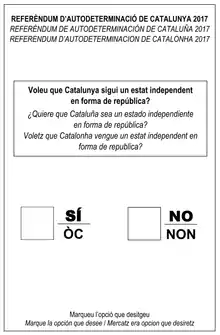
The Catalan Government announced it planned to hold the referendum on 1 October 2017. The Electoral Commission of Catalonia was responsible for overseeing the referendum, but it was dissolved on 22 September 2017 after the Constitutional Court announced that otherwise they would be fined between €6,000 and €12,000 per day.[121] The campaign was planned to last 15 days, spanning from 00:00 on 15 September 2017 to 24:00 on 29 September 2017.
According to the Catalan government, the following people were entitled to vote in the referendum:[122]
- Those who have the political condition of Catalan, are 18 years of age or older on the voting day, are not under any of the situations that legally deprive the right to vote and are on the electoral roll.
- Those Catalans currently residing abroad and who have their last residence in Catalonia, fulfil all the legal requirements, and have formally applied to take part in the voting process.
Question
The question of the referendum was asked "Do you want Catalonia to become an independent state in the form of a republic?".[122]
| English | Do you want Catalonia to become an independent state in the form of a republic? |
|---|---|
| Catalan | Voleu que Catalunya sigui un estat independent en forma de república? |
| Spanish | ¿Quiere que Cataluña sea un estado independiente en forma de república? |
| Occitan | Voletz que Catalonha vengue un estat independent en forma de republica? |
International observers
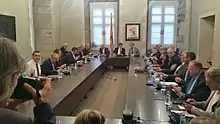
The referendum was attended by several international observers. The first accredited international observers, led by The Hague Center for Strategic Studies, were headed by Daan Everts and consisted of 20 observers from the United States of America, the United Kingdom, the Netherlands, France and Poland, among others. The second international mission, called the International Electoral Expert Research Team, was headed by Helena Catt and consisted of 17 observers from the United Kingdom, France, Ireland and New Zealand, among others. There was also a delegation of 33 parliamentarians and politicians, called the International Parliamentary Delegation on Catalonia's Referendum on Self-Determination 1 October 2017, from political parties in Slovakia, Belgium, Denmark, Estonia, Finland, France, Germany, Greece, Iceland, Ireland, Israel, Latvia, Republic of Macedonia, Monaco, Spain, Sweden and United Kingdom.
Of these international observers, those summoned by Diplocat are not recognised by the UN as such in not recognising this Diplocat as an international observer.[123]
Due to some alleged irregularities and to the actions taken by the national police and civil guard, the international observers, invited by the Generalitat, declared that the referendum results could not be considered valid as the process failed to meet the minimum international standards for elections. They also criticized the police violence.[14][15][16]
Pre-result responses
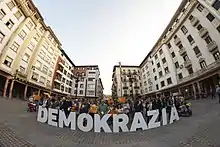
Domestic
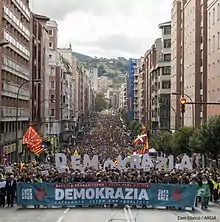
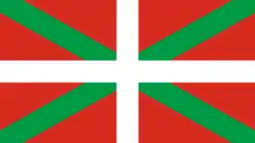 Basque Autonomous Community: The regional parliament showed its sympathy and support for the referendum and strongly criticised the Spanish government's stance on the issue. It denounced any measures taken against the vote or democracy altogether.[124] Tens of thousands took to the streets of Bilbao at two different dates in September in support of the Catalan referendum, sovereignty and democracy.[125] The latter was attended by the three main political forces of the Basque Autonomous Community, Geroa Bai, Basque nationalist unions ELA and LAB, and high-ranking public officials like the mayors of San Sebastián and Bilbao, E. Goia and J.M. Aburto.[126] ETA, for its part, issued a statement endorsing the referendum.[127]
Basque Autonomous Community: The regional parliament showed its sympathy and support for the referendum and strongly criticised the Spanish government's stance on the issue. It denounced any measures taken against the vote or democracy altogether.[124] Tens of thousands took to the streets of Bilbao at two different dates in September in support of the Catalan referendum, sovereignty and democracy.[125] The latter was attended by the three main political forces of the Basque Autonomous Community, Geroa Bai, Basque nationalist unions ELA and LAB, and high-ranking public officials like the mayors of San Sebastián and Bilbao, E. Goia and J.M. Aburto.[126] ETA, for its part, issued a statement endorsing the referendum.[127] Navarre: The parliament of Navarre denounced the Spanish government's de facto "takeover" of the Catalan devolution and what the parliament referred to as a repressive approach.[128]
Navarre: The parliament of Navarre denounced the Spanish government's de facto "takeover" of the Catalan devolution and what the parliament referred to as a repressive approach.[128]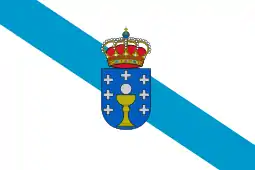 Galicia: Over 3,000 people marched through the streets of Santiago in Galicia to show their solidarity with the Catalan vote. The demonstration was attended by representatives of En Marea and BNG.[129]
Galicia: Over 3,000 people marched through the streets of Santiago in Galicia to show their solidarity with the Catalan vote. The demonstration was attended by representatives of En Marea and BNG.[129] Madrid: A discussion event in favour of the referendum was organised in a public venue but relocated following the Spanish Conservatives' cancellation demand to the mayor of Madrid Manuela Carmena, on the grounds that it "incites illegal actions", "defies institutions and constitutional legality" and "offends the monarchy".[130] A judge then stepped in ordering a ban on an event held in a public venue,[131] but it was eventually held on 17 September in an independent theater, growing into a rally for the freedom of expression in the street.[132] The mayor of Madrid, besides requesting the Spanish premier's resignation for his "inability to dialogue", also criticised the Catalan referendum for "not meeting the minimum standards" and the violence enforced by the Spanish police in Catalonia.[133]
Madrid: A discussion event in favour of the referendum was organised in a public venue but relocated following the Spanish Conservatives' cancellation demand to the mayor of Madrid Manuela Carmena, on the grounds that it "incites illegal actions", "defies institutions and constitutional legality" and "offends the monarchy".[130] A judge then stepped in ordering a ban on an event held in a public venue,[131] but it was eventually held on 17 September in an independent theater, growing into a rally for the freedom of expression in the street.[132] The mayor of Madrid, besides requesting the Spanish premier's resignation for his "inability to dialogue", also criticised the Catalan referendum for "not meeting the minimum standards" and the violence enforced by the Spanish police in Catalonia.[133]
UN member states
.svg.png.webp) Belgium: Belgium's Prime Minister Charles Michel reaffirmed the government's call for political dialogue in Spain, and made an official reaction to the violence used to obstruct the referendum, on Twitter on 1 October: "Violence can never be the answer! We condemn all forms of violence and reaffirm our call for political dialogue #CatalanReferendum #Spain".[134]
Belgium: Belgium's Prime Minister Charles Michel reaffirmed the government's call for political dialogue in Spain, and made an official reaction to the violence used to obstruct the referendum, on Twitter on 1 October: "Violence can never be the answer! We condemn all forms of violence and reaffirm our call for political dialogue #CatalanReferendum #Spain".[134] Croatia: Croatian Prime Minister Andrej Plenković stated that Croatia considers this referendum an internal issue of Spain, while Croatian Ministry of Foreign and European Affairs called on Spanish and Catalan government's to launch a dialogue on finding a peaceful solution to the problem.[135]
Croatia: Croatian Prime Minister Andrej Plenković stated that Croatia considers this referendum an internal issue of Spain, while Croatian Ministry of Foreign and European Affairs called on Spanish and Catalan government's to launch a dialogue on finding a peaceful solution to the problem.[135] China: In response to a journalist's question, on 28 September 2017 foreign ministry spokesman Lu Kang said that the People's Republic of China believes "the issue of Catalonia belongs to the domestic affairs of Spain. We believe that the Spanish central government can properly handle relevant issues and maintain national solidarity, unity and prosperity".[136]
China: In response to a journalist's question, on 28 September 2017 foreign ministry spokesman Lu Kang said that the People's Republic of China believes "the issue of Catalonia belongs to the domestic affairs of Spain. We believe that the Spanish central government can properly handle relevant issues and maintain national solidarity, unity and prosperity".[136] France: On 16 June, President Emmanuel Macron stated that he considers the question of Catalan independence to be an internal issue of Spain.[137]
France: On 16 June, President Emmanuel Macron stated that he considers the question of Catalan independence to be an internal issue of Spain.[137] Germany: On 8 September, Steffen Seibert, the spokesman for Chancellor Angela Merkel, stated that Germany was interested in stability in Spain and that for this it was necessary that the law, including the Spanish constitution, was respected at all levels.[138] The German government had issued a similar statement previously in 2015.[139]
Germany: On 8 September, Steffen Seibert, the spokesman for Chancellor Angela Merkel, stated that Germany was interested in stability in Spain and that for this it was necessary that the law, including the Spanish constitution, was respected at all levels.[138] The German government had issued a similar statement previously in 2015.[139] Hungary: On 18 September, government spokesman Zoltán Kovács announced that they would "respect the will of the people". At the same time, he called the independence issue an "internal issue of Spain and Catalonia".[140][141]
Hungary: On 18 September, government spokesman Zoltán Kovács announced that they would "respect the will of the people". At the same time, he called the independence issue an "internal issue of Spain and Catalonia".[140][141] Lithuania:
Lithuania:
- Lithuanian President Dalia Grybauskaitė said that the referendum on Catalonia's independence did not comply with the Spanish Constitution, but to use force is a failure of the Spanish authorities. The President believes that Madrid and Barcelona will, in any case, speak with one another and look for solutions to democratic problems.[142]
- On 28 September, Minister of Foreign Affairs Linas Linkevičius commented that Baltic states' movement to regain independence from the Soviet Union is not comparable with situation in Catalonia due to Spain being a democracy that follows the rule of law. At the same time he urged both parties to have a constructive dialogue without any unnecessary measures.[143][144]
 Portugal: Foreign Minister Augusto Santos Silva declined to comment on the referendum in Catalonia on 27 September, but believes that the Spanish government will be able to resolve the issue, in agreement with the Spanish constitution and law. Augusto Santos Silva said that this is an internal affair of Spain.[145] In a manifesto signed by almost a hundred people, academics, deputies, journalists, doctors, journalists and notably by the former socialist presidential candidate Manuel Alegre and the former leader of the Left Bloc Francisco Louçã appealed to a "negotiated political solution" to the political situation in Catalonia, considering themselves "outraged" by the civil rights abuses committed by the Spanish Government.[146]
Portugal: Foreign Minister Augusto Santos Silva declined to comment on the referendum in Catalonia on 27 September, but believes that the Spanish government will be able to resolve the issue, in agreement with the Spanish constitution and law. Augusto Santos Silva said that this is an internal affair of Spain.[145] In a manifesto signed by almost a hundred people, academics, deputies, journalists, doctors, journalists and notably by the former socialist presidential candidate Manuel Alegre and the former leader of the Left Bloc Francisco Louçã appealed to a "negotiated political solution" to the political situation in Catalonia, considering themselves "outraged" by the civil rights abuses committed by the Spanish Government.[146] Russian Federation: The head of the international affairs committee at Russia's upper house Konstantin Kosachev called on the Spanish government to lead a dialogue with the Catalans. Otherwise their contradictions will only deepen, which could end with the breakup of the state, as it was also evident in Ukraine. This polling, like the earlier polling in Iraqi Kurdistan, "is another clear and evident clash of the basic principles the humanity follows: the territorial integrity and the right to self-determination". "A state should be talking to its citizens, should reach accord. Like we are doing in Russia."[147]
Russian Federation: The head of the international affairs committee at Russia's upper house Konstantin Kosachev called on the Spanish government to lead a dialogue with the Catalans. Otherwise their contradictions will only deepen, which could end with the breakup of the state, as it was also evident in Ukraine. This polling, like the earlier polling in Iraqi Kurdistan, "is another clear and evident clash of the basic principles the humanity follows: the territorial integrity and the right to self-determination". "A state should be talking to its citizens, should reach accord. Like we are doing in Russia."[147] Serbia: Minister of Foreign Affairs Ivica Dačić, in an interview with Deutsche Welle, stated that Catalonia wants to repeat the example of Kosovo, by declaring unilateral independence without any agreement from Madrid.[148] He stated that Serbia cannot accept such a model and that it is not a political issue but a problem of international law.[148]
Serbia: Minister of Foreign Affairs Ivica Dačić, in an interview with Deutsche Welle, stated that Catalonia wants to repeat the example of Kosovo, by declaring unilateral independence without any agreement from Madrid.[148] He stated that Serbia cannot accept such a model and that it is not a political issue but a problem of international law.[148] United Kingdom: Foreign Secretary, and future Prime Minister Boris Johnson described the referendum as an internal issue for Spain, saying "Spain is a close ally and a good friend, whose strength and unity matters to the UK", while also insisting rule of law be upheld.[149]
United Kingdom: Foreign Secretary, and future Prime Minister Boris Johnson described the referendum as an internal issue for Spain, saying "Spain is a close ally and a good friend, whose strength and unity matters to the UK", while also insisting rule of law be upheld.[149] United States: On 13 April, the embassy in Madrid stated that the U.S. sees the question of Catalan independence as an internal issue of Spain.[150] On 26 September, President Donald Trump, during his meeting with Mariano Rajoy, said that "Spain is a great country and it should remain united",[151] but expressed his doubts on whether a referendum will be held, stating that "I think that nobody knows if they are gonna have a vote. The President would say they are not going to have a vote. But I think that the people would be very much opposed to that."[151] Earlier that month, the State Department spokeswoman Heather Nauert insisted in that the referendum is an internal affair of Spain and that the US "will work with whatever government or entity that comes out of it".[152]
United States: On 13 April, the embassy in Madrid stated that the U.S. sees the question of Catalan independence as an internal issue of Spain.[150] On 26 September, President Donald Trump, during his meeting with Mariano Rajoy, said that "Spain is a great country and it should remain united",[151] but expressed his doubts on whether a referendum will be held, stating that "I think that nobody knows if they are gonna have a vote. The President would say they are not going to have a vote. But I think that the people would be very much opposed to that."[151] Earlier that month, the State Department spokeswoman Heather Nauert insisted in that the referendum is an internal affair of Spain and that the US "will work with whatever government or entity that comes out of it".[152]
Other political parties, groups and sub-national governments
 United Kingdom:
United Kingdom:
- Jeremy Corbyn, leader of the UK Labour Party, issued a statement condemning the violence in Catalonia and called on the British government to appeal to the Spanish government to end its crackdown in Catalonia.[153] Later, previous Labour leader Ed Milliband issued a similar statement, describing scenes as "appalling" and saying "the U.K. government cannot just stay silent".[154]
- Northern Ireland: Michelle Gildernew, the Sinn Féin MP for Fermanagh South Tyrone, called for international recognition of the referendum.[155]
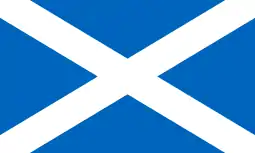 Scotland: On 16 September, Fiona Hyslop, the Scottish Government Cabinet Secretary for External Affairs, said: "The decision over Catalonia's future direction is a matter for the people who live there, and the Catalan and Spanish Governments are perfectly entitled to take positions for and against independence. However, all peoples have the right to self-determination and to choose the form of government best suited to their needs, a principle which is enshrined in the UN Charter."[156]
Scotland: On 16 September, Fiona Hyslop, the Scottish Government Cabinet Secretary for External Affairs, said: "The decision over Catalonia's future direction is a matter for the people who live there, and the Catalan and Spanish Governments are perfectly entitled to take positions for and against independence. However, all peoples have the right to self-determination and to choose the form of government best suited to their needs, a principle which is enshrined in the UN Charter."[156].svg.png.webp) Wales: First Minister Carwyn Jones of Welsh Labour talked of "violence replacing democracy and dialogue",[157] while leader of Plaid Cymru Leanne Wood criticised this position describing violence as "not on both sides".[158]
Wales: First Minister Carwyn Jones of Welsh Labour talked of "violence replacing democracy and dialogue",[157] while leader of Plaid Cymru Leanne Wood criticised this position describing violence as "not on both sides".[158]
 Republic of Ireland: Mick Barry TD of Solidarity attended the referendum as an international observer, the party condemned the violence and showed support for the declaration of a general strike.[159][160] On 22 September, in a letter to Spanish Prime Minister Mariano Rajoy, the Lord Mayor, Mícheál Mac Donncha, regretted the legal prosecution of over 700 Catalan Mayors and urged them "to find a political solution to Catalonia's legitimate claims and ask you to stop threats on my fellow Mayors".[161]
Republic of Ireland: Mick Barry TD of Solidarity attended the referendum as an international observer, the party condemned the violence and showed support for the declaration of a general strike.[159][160] On 22 September, in a letter to Spanish Prime Minister Mariano Rajoy, the Lord Mayor, Mícheál Mac Donncha, regretted the legal prosecution of over 700 Catalan Mayors and urged them "to find a political solution to Catalonia's legitimate claims and ask you to stop threats on my fellow Mayors".[161] Denmark: A group of 17 Danish MPs from seven parties criticised the growing tensions in the weeks before the referendum and called on the Spanish government to play a constructive role and encourage political dialogue.[162]
Denmark: A group of 17 Danish MPs from seven parties criticised the growing tensions in the weeks before the referendum and called on the Spanish government to play a constructive role and encourage political dialogue.[162] European Union Parliament: Gregor Gysi, the chairman of the Party of the European Left, condemned the arrests by the Guardia Civil in the run-up to the referendum and called for a political solution to the problem.[163]
European Union Parliament: Gregor Gysi, the chairman of the Party of the European Left, condemned the arrests by the Guardia Civil in the run-up to the referendum and called for a political solution to the problem.[163] Italy:
Italy:
- The Lega Nord leader Matteo Salvini expressed his solidarity to the Catalan people after the arrests of 14 Catalan government officials;[164] however, he also kept distance from the Catalan referendum calling it "a stretch" against the Spanish law.[165][166]
 Sardinia: The regional government expressed its support and solidarity to the Catalan community through a specific resolution approved by the regional council, and offered to print ballots for the referendum and to guard them, rejecting the negative attitude of the Spanish government towards political dialogue.[167][168][169][170] On 25 October, the Sardinian council issued a new resolution condemning the use of violence adopted by the Civil Guard and expressing the wish that Catalans may pursue a pacific path towards the right to choose any political option, including self-determination.[171]
Sardinia: The regional government expressed its support and solidarity to the Catalan community through a specific resolution approved by the regional council, and offered to print ballots for the referendum and to guard them, rejecting the negative attitude of the Spanish government towards political dialogue.[167][168][169][170] On 25 October, the Sardinian council issued a new resolution condemning the use of violence adopted by the Civil Guard and expressing the wish that Catalans may pursue a pacific path towards the right to choose any political option, including self-determination.[171]
.svg.png.webp) Belgium: On 20 September, the Minister-President of the Flemish Region Geert Bourgeois said: "I regret the recent escalation with a display of power from both the police and court in the Catalan capital and I urgently call upon the Spanish government to go into dialogue with the Catalan government, the legitimate representative of the Catalan people. If this is currently impossible, there must be international mediation."[172]
Belgium: On 20 September, the Minister-President of the Flemish Region Geert Bourgeois said: "I regret the recent escalation with a display of power from both the police and court in the Catalan capital and I urgently call upon the Spanish government to go into dialogue with the Catalan government, the legitimate representative of the Catalan people. If this is currently impossible, there must be international mediation."[172] Switzerland: On 27 September, a group of MPs from all parties of the Council of States sent a letter to the Spanish government supporting the Catalan referendum, stating that "without taking a decision on the choice to be made, we believe that the right of the Catalan people to determine their future must be respected", and condemning the arrests of people and seizure of voting material as "unworthy of a modern and democratic state".[173]
Switzerland: On 27 September, a group of MPs from all parties of the Council of States sent a letter to the Spanish government supporting the Catalan referendum, stating that "without taking a decision on the choice to be made, we believe that the right of the Catalan people to determine their future must be respected", and condemning the arrests of people and seizure of voting material as "unworthy of a modern and democratic state".[173] Rojava: On 29 September, TEV-DEM declared their support for the referendum.[174]
Rojava: On 29 September, TEV-DEM declared their support for the referendum.[174] Slovenia: Speaker of the National Assembly Milan Brglez stated that the "Catalans have the right to self-determination".[175]
Slovenia: Speaker of the National Assembly Milan Brglez stated that the "Catalans have the right to self-determination".[175]
International organisations and institutions
 European Union: On 7 September, Antonio Tajani, the President of the European Parliament, stated in a letter to Spanish MEP Beatriz Becerra (UPyD) that the constitutional order of each EU member state needed to be respected at all times. He also stated that if a territory would secede from an EU member state, it would become a third country with respect to the EU and the EU treaties would no longer apply there.[176]
European Union: On 7 September, Antonio Tajani, the President of the European Parliament, stated in a letter to Spanish MEP Beatriz Becerra (UPyD) that the constitutional order of each EU member state needed to be respected at all times. He also stated that if a territory would secede from an EU member state, it would become a third country with respect to the EU and the EU treaties would no longer apply there.[176]
- On 14 September, the President of the European Commission, Jean-Claude Juncker, said that the EU "would follow and respect the rulings of the Spanish constitutional court and parliament".[177] Further, while the EU would respect the choice if a "yes" for Catalan independence were to come to pass, Juncker stated that Catalonia could not become an EU member the day after the vote.[178]
- On 2 October, the European Commission released a statement on its webpage declaring the referendum illegal.[179]
 Council of Europe: The Council of Europe, when consulted by Carles Puigdemont, said that any referendum must be carried out "in full compliance with the constitution".[180]
Council of Europe: The Council of Europe, when consulted by Carles Puigdemont, said that any referendum must be carried out "in full compliance with the constitution".[180]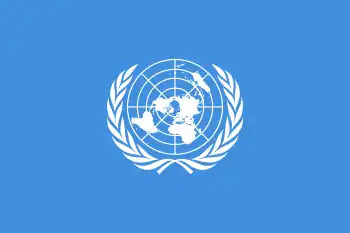 United Nations: The UN has refused to participate in the monitoring of the referendum.[181]
United Nations: The UN has refused to participate in the monitoring of the referendum.[181]
On 23 September, the UN Independent Expert on the Promotion of a Democratic and Equitable International Order, Alfred de Zayas, issued a media statement[182] where he advocates for the right of self-determination of Catalan people, reminding "[t]he Spanish Constitution itself stipulates in its articles 10 and 96 the supremacy of international law and in particular international human rights law over of domestic law" and that "self-determination is not limited to the decolonisation context".
Opinion polls
On 1 October 2017 referendum
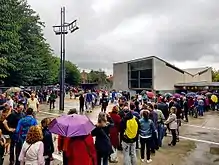
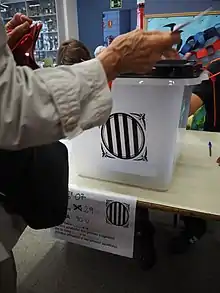
Pollsters generally started using the proposed referendum question ("Do you want Catalonia to be an independent state in the form of a republic?") after it was revealed in early June 2017.[183]
The Centre for Opinion Studies (Centre d'Estudis d'Opinió, CEO) polled respondents on their intentions rather than asking them the actual referendum question. In its March 2017 poll, aside from asking respondents whether they would want Catalonia to become an independent state, it asked their intents in the event of a referendum on the independence of Catalonia being called and organised by the Government of Catalonia without agreement from the Spanish Government. In a July 2017 poll a similar question was proposed, with the difference that it asked about the actual 1 October referendum.
Total
| Polling firm/Commissioner | Fieldwork date | Sample size | Yes | No | Other/ Abst. |
Lead | |
|---|---|---|---|---|---|---|---|
| Opinòmetre/Ara[p 1] | 16 Sep 2017 | 1,000 | 44.1 | 38.1 | 3.9 | 13.9 | 6.0 |
| NC Report/La Razón[p 2][p 3] | 1–8 Aug 2017 | 800 | 41.5 | 48.6 | – | 9.9 | 7.1 |
| Opinòmetre/Ara[p 4] | 17–20 Jul 2017 | 1,000 | 41.9 | 37.8 | 4.2 | 16.1 | 4.1 |
| GESOP/CEO[p 5][p 6] | 26 Jun–11 Jul 2017 | 1,500 | 39.0 | 23.5 | 23.0 | 14.5 | 15.5 |
| NC Report/La Razón[p 7][p 8] | 29 Jun–1 Jul 2017 | 800 | 44.0 | 48.6 | – | 7.4 | 4.6 |
| GAD3/La Vanguardia[p 9] | 23–29 Jun 2017 | ? | 42.5 | 37.6 | 10.2 | 9.7 | 4.9 |
| DYM/El Confidencial[p 10] | 22–28 Jun 2017 | 531 | 47.0 | 44.4 | – | 8.6 | 2.6 |
| Opinòmetre/Ara[p 11] | 12–15 Jun 2017 | 1,000 | 42.3 | 38.9 | 6.0 | 12.8 | 3.4 |
| GESOP/CEO[p 12] | 6–21 Mar 2017 | 1,500 | 43.3 | 22.2 | 28.6 | 5.9 | 21.1 |
Certain to vote
(Note: voters who were not willing to vote were primarily those opposed to independence and/or a referendum being held, so support for independence among those who were certain to vote was expected to be high.)[31]
| Polling firm/Commissioner | Fieldwork date | Sample size | Turnout | Yes | No | Lead | |
|---|---|---|---|---|---|---|---|
| The National[p 13] | 30 Sep 2017 | 3,300 | 62 | 83.0 | 16.0 | 2.0 | 67.0 |
| Opinòmetre/Ara[p 1] | 16 Sep 2017 | 1,000 | 51.0 | 69.9 | 14.3 | 15.8 | 55.6 |
| Celeste-Tel/eldiario.es[p 14] | 12–15 Sep 2017 | 800 | 59.9 | 59.5 | 30.7 | 9.8 | 28.8 |
| Sociométrica/El Español[p 15] | 28 Aug–1 Sep 2017 | 700 | 50 | 72.0 | 28.0 | – | 44.0 |
| Opinòmetre/Ara[p 4] | 17–20 Jul 2017 | 1,000 | 54.9 | 66.5 | 18.5 | 15.0 | 48.0 |
| GESOP/CEO[p 5] | 26 Jun–11 Jul 2017 | 1,500 | 67.5 | 57.8 | 34.8 | 7.4 | 23.0 |
| DYM/El Confidencial[p 10] | 22–28 Jun 2017 | 531 | 70.1 | 65.4 | 28.4 | 6.2 | 37.0 |
| Opinòmetre/Ara[p 11] | 12–15 Jun 2017 | 1,000 | 54.9 | 67.0 | 19.0 | 14.0 | 48.0 |
On the independence issue
| Polling firm/Commissioner | Fieldwork date | Sample size | Yes | No | Other/ Abst. |
Lead | Question | |
|---|---|---|---|---|---|---|---|---|
| Sociométrica/El Español[p 16] | 28 Aug–1 Sep 2017 | 700 | 50.1 | 45.7 | – | 4.2 | 4.4 | [upper-roman 1] |
| GESOP/CEO[p 5] | 26 Jun–11 Jul 2017 | 1,500 | 41.1 | 49.4 | – | 9.5 | 8.3 | [upper-roman 2] |
| GAD3/La Vanguardia[p 17] | 7–12 Apr 2017 | 601 | 41.9 | 39.7 | 9.1 | 9.3 | 2.2 | [upper-roman 3] |
| GESOP/CEO[p 12] | 6–21 Mar 2017 | 1,500 | 44.3 | 48.5 | – | 7.2 | 4.2 | [upper-roman 2] |
| GAD3/La Vanguardia[p 18] | 2–5 Jan 2017 | 601 | 42.3 | 41.9 | 5.9 | 9.9 | 0.4 | [upper-roman 3] |
| NC Report/La Razón[p 19][p 20] | 16–23 Dec 2016 | 1,000 | 44.8 | 47.2 | – | 8.0 | 2.4 | [upper-roman 4] |
| DYM/CEO[p 21] | 12–17 Dec 2016 | 1,047 | 45.3 | 46.8 | – | 7.8 | 1.5 | [upper-roman 2] |
| GESOP/El Periódico[p 22] | 12–14 Dec 2016 | 800 | 48.9 | 40.3 | 2.4 | 8.5 | 8.6 | [upper-roman 5] |
| Opinòmetre/CEO[p 23] | 17 Oct–3 Nov 2016 | 1,500 | 44.9 | 45.1 | – | 9.9 | 0.2 | [upper-roman 2] |
| GESOP/ICPS[p 24] | 26 Sep–17 Oct 2016 | 1,200 | 46.6 | 33.8 | 15.0 | 4.7 | 10.2 | [upper-roman 6] |
| NC Report/La Razón[p 25] | 2–6 Aug 2016 | 1,255 | 41.3 | 43.2 | – | 15.5 | 1.9 | [upper-roman 7] |
| Opinòmetre/CEO[p 26] | 28 Jun–13 Jul 2016 | 1,500 | 47.7 | 42.4 | – | 10.0 | 5.3 | [upper-roman 2] |
| GAD3/La Vanguardia[p 27] | 13–16 Jun 2016 | 800 | 48.4 | 35.3 | 7.7 | 8.6 | 13.1 | [upper-roman 3] |
| Opinòmetre/CEO[p 28] | 22 Feb–8 Mar 2016 | 1,500 | 45.3 | 45.5 | – | 9.2 | 0.2 | [upper-roman 2] |
| NC Report/La Razón[p 29][p 30] | 28–31 Dec 2015 | 1,255 | 44.1 | 49.7 | – | 6.2 | 5.6 | [upper-roman 8] |
| DYM/El Confidencial[p 31] | 30 Nov–3 Dec 2015 | 504 | 37.0 | 54.0 | – | 9.0 | 17.0 | [upper-roman 9] |
| Feedback/La Vanguardia[p 32] | 20–27 Nov 2015 | 1,000 | 45.5 | 48.7 | – | 5.2 | 3.2 | [upper-roman 10] |
| GESOP/CEO[p 33] | 16–23 Nov 2015 | 1,050 | 46.6 | 48.2 | – | 5.2 | 1.6 | [upper-roman 2] |
| Opinòmetre/CEO[p 34] | 5–27 Oct 2015 | 2,000 | 46.7 | 47.8 | – | 5.6 | 1.1 | [upper-roman 2] |
| 2015 Catalan regional election | ||||||||
| Feedback/La Vanguardia[p 35] | 14–17 Sep 2015 | 1,000 | 45.2 | 45.9 | – | 8.9 | 0.7 | [upper-roman 10] |
| Metroscopia/El País[p 36] | 14–16 Sep 2015 | 2,000 | 45.0 | 46.0 | – | 9.0 | 1.0 | [upper-roman 11] |
| DYM/El Confidencial[p 37] | 14–16 Sep 2015 | 1,157 | 50.0 | 42.0 | – | 8.0 | 8.0 | [upper-roman 9] |
| Sigma Dos/El Mundo[p 38][p 39] | 31 Aug–3 Sep 2015 | 1,400 | 44.4 | 46.2 | – | 9.4 | 1.8 | [upper-roman 12] |
| Feedback/La Vanguardia[p 40] | 6–9 Jul 2015 | 1,000 | 44.5 | 48.4 | – | 7.1 | 3.9 | [upper-roman 13] |
| Opinòmetre/CEO[p 41] | 2–24 Jun 2015 | 2,000 | 42.9 | 50.0 | – | 7.1 | 7.1 | [upper-roman 2] |
| Feedback/La Vanguardia[p 42] | 27–29 Apr 2015 | 1,000 | 43.7 | 47.9 | – | 8.3 | 4.2 | [upper-roman 13] |
| Opinòmetre/CEO[p 43] | 9 Feb–2 Mar 2015 | 2,000 | 44.1 | 48.0 | – | 7.8 | 3.9 | [upper-roman 2] |
| DYM/CEO[p 44] | 9–13 Dec 2014 | 1,100 | 44.5 | 45.3 | – | 10.3 | 0.8 | [upper-roman 2] |
| GESOP/ICPS[p 45] | 12 Nov–6 Dec 2014 | 1,200 | 49.9 | 27.4 | 18.8 | 4.1 | 22.5 | [upper-roman 6] |
| Feedback/La Vanguardia[p 46] | 1–4 Dec 2014 | 1,000 | 47.4 | 42.9 | – | 9.7 | 4.5 | [upper-roman 13] |
| Sigma Dos/El Mundo[p 47] | 17–20 Nov 2014 | 1,000 | 35.7 | 44.7 | 9.6 | 10.0 | 9.0 | [upper-roman 2] |
| 2014 Catalan self-determination referendum | ||||||||
| GESOP/8tv[p 48] | 30 Oct 2014 | 1,600 | 46.2 | 38.0 | – | 15.8 | 8.2 | [upper-roman 2] |
| Opinòmetre/CEO[p 49] | 29 Sep–23 Oct 2014 | 2,000 | 49.4 | 32.3 | 8.4 | 10.0 | 17.1 | [upper-roman 2] |
| Sigma Dos/El Mundo[p 50] | 26–29 Aug 2014 | ? | 34.0 | 39.5 | – | 19.2 | 5.5 | [upper-roman 2] |
| Feedback/La Vanguardia[p 51] | 30 Apr–8 May 2014 | 577 | 43.4 | 43.5 | – | 13.4 | 0.1 | [upper-roman 2] |
| Opinòmetre/CEO[p 52] | 24 Mar–15 Apr 2014 | 2,000 | 47.2 | 27.9 | 12.4 | 12.6 | 19.3 | [upper-roman 2] |
| GESOP/El Periódico[p 53] | 26–28 Feb 2014 | 800 | 46.1 | 36.3 | – | 17.6 | 9.8 | [upper-roman 2] |
| GESOP/El Periódico[p 54] | 12–13 Dec 2013 | 800 | 44.1 | 36.2 | – | 19.7 | 7.9 | [upper-roman 2] |
| Feedback/La Vanguardia[p 55] | 16–19 Nov 2013 | 1,000 | 44.9 | 45.0 | – | 10.1 | 0.1 | [upper-roman 2] |
| GESOP/CEO[p 56] | 4–14 Nov 2013 | 2,000 | 54.7 | 22.1 | 17.0 | 6.3 | 32.6 | [upper-roman 6] |
| GESOP/El Periódico[p 57] | 16–18 Oct 2013 | 800 | 53.3 | 41.5 | – | 5.3 | 11.8 | [upper-roman 14] |
| GESOP/ICPS[p 58] | 25 Sep–10 Oct 2013 | 800 | 48.6 | 25.2 | 21.9 | 4.3 | 23.4 | [upper-roman 6] |
| GESOP/CEO[p 59] | 31 May–13 Jun 2013 | 2,000 | 55.6 | 23.4 | 15.9 | 5.1 | 32.2 | [upper-roman 6] |
| GESOP/El Periódico[p 60] | 28–31 May 2013 | 800 | 57.8 | 36.0 | – | 6.3 | 21.8 | [upper-roman 14] |
| GESOP/CEO[p 61] | 4–14 Feb 2013 | 2,000 | 54.7 | 20.7 | 18.1 | 6.4 | 34.0 | [upper-roman 6] |
| GESOP/El Periódico[p 62] | 14–16 Jan 2013 | 800 | 56.9 | 35.0 | – | 8.2 | 21.9 | [upper-roman 14] |
| GESOP/ICPS[p 63] | 27 Nov–20 Dec 2012 | 1,200 | 49.2 | 29.2 | 15.1 | 6.5 | 20.0 | [upper-roman 6] |
| 2012 Catalan regional election | ||||||||
| Feedback/La Vanguardia[p 64] | 12–16 Nov 2012 | 1,000 | 47.5 | 40.2 | – | 10.1 | 7.3 | [upper-roman 15] |
| Feedback/La Vanguardia[p 65] | 6–9 Nov 2012 | 1,000 | 47.9 | 39.9 | – | 10.2 | 8.0 | [upper-roman 15] |
| DYM/CEO[p 66] | 22–30 Oct 2012 | 2,500 | 57.0 | 20.5 | 14.9 | 7.7 | 36.5 | [upper-roman 6] |
| Feedback/La Vanguardia[p 67] | 22–26 Oct 2012 | 1,000 | 52.8 | 35.4 | – | 9.7 | 17.4 | [upper-roman 15] |
| Feedback/La Vanguardia[p 68] | 8–11 Oct 2012 | 1,000 | 54.3 | 33.1 | – | 10.1 | 21.2 | [upper-roman 15] |
| Feedback/La Vanguardia[p 69] | 21–27 Sep 2012 | 1,200 | 54.8 | 33.5 | – | 10.2 | 21.3 | [upper-roman 15] |
| DYM/CEO[p 70] | 4–18 Jun 2012 | 2,500 | 51.1 | 21.1 | 22.1 | 5.8 | 30.0 | [upper-roman 6] |
| DYM/CEO[p 71] | 6–21 Feb 2012 | 2,500 | 44.6 | 24.7 | 25.2 | 5.5 | 19.9 | [upper-roman 6] |
| GESOP/ICPS[p 72] | 19 Sep–27 Oct 2011 | 2,000 | 43.7 | 25.1 | 23.2 | 8.0 | 18.6 | [upper-roman 6] |
| GESOP/CEO[p 73] | 29 Sep–13 Oct 2011 | 2,500 | 45.4 | 24.7 | 24.4 | 5.6 | 20.7 | [upper-roman 6] |
| GESOP/CEO[p 74] | 2–17 Jun 2011 | 2,500 | 42.9 | 28.2 | 23.8 | 5.2 | 14.7 | [upper-roman 6] |
| Noxa/La Vanguardia[p 75] | 1–2 Sep 2010 | 800 | 40.0 | 45.0 | 10.0 | 5.0 | 5.0 | [upper-roman 16] |
| ||||||||
On whether a referendum should be held
| Polling firm/Commissioner | Fieldwork date | Sample size | Yes | No | Notes | |
|---|---|---|---|---|---|---|
| Metroscopia/El País[p 76] | 18–21 Sep 2017 | 2,200 | 82 | 16 | 2 | On a legal referendum as the best solution |
| GESOP/El Periódico[p 77] | 19–22 Feb 2017 | ? | 71.9 | 26.1 | 2.0 | On the State allowing a referendum |
| GAD3/La Vanguardia[p 18] | 13–16 Jun 2016 | 800 | 76.6 | 19.7 | 3.6 | |
| NC Report/La Razón[p 19][p 20] | 16–23 Dec 2016 | 1,000 | 51.1 | 40.7 | 8.2 | On holding a 9N-style referendum |
| GESOP/El Periódico[p 22] | 12–14 Dec 2016 | 800 | 84.6 | 13.8 | 1.6 | |
| 49.6 | 48.8 | 1.6 | On holding a not legal referendum | |||
| NC Report/La Razón[p 25] | 2–6 Aug 2016 | 1,255 | 52.0 | 35.1 | 12.9 | On agreeing a referendum with the State |
| GAD3/La Vanguardia[p 27] | 13–16 Jun 2016 | 800 | 75.7 | 20.6 | 3.7 | |
| DYM/El Confidencial[p 31] | 30 Nov–3 Dec 2015 | 504 | 69.0 | 26.0 | 5.0 | On the need of holding a referendum |
| Feedback/La Vanguardia[p 32] | 20–27 Nov 2015 | 1,000 | 78.8 | 19.9 | 1.3 | |
| Feedback/La Vanguardia[p 35] | 14–17 Sep 2015 | 1,000 | 79.2 | 18.6 | 2.2 | |
| Feedback/La Vanguardia[p 40] | 6–9 Jul 2015 | 1,000 | 79.8 | 19.4 | 0.8 | |
| Feedback/La Vanguardia[p 42] | 27–29 Apr 2015 | 1,000 | 79.1 | 19.4 | 1.5 | |
| Feedback/La Vanguardia[p 46] | 1–4 Dec 2014 | 1,000 | 83.9 | 14.5 | 1.6 | |
| NC Report/La Razón[p 78] | 13–15 Nov 2014 | ? | 54.3 | 39.9 | 5.8 | On holding an agreed referendum |
| Feedback/La Vanguardia[p 51] | 30 Apr–8 May 2014 | 577 | 74.0 | 24.6 | 1.4 | |
| GESOP/El Periódico[p 54] | 12–13 Dec 2013 | 800 | 73.6 | 20.0 | 6.4 | On the State authorising the 9N referendum |
| Feedback/La Vanguardia[p 55] | 16–19 Nov 2013 | 1,000 | 73.5 | 23.6 | 2.9 | |
| GESOP/El Periódico[p 60] | 28–31 May 2013 | 800 | 75.1 | 20.8 | 4.2 | On the Government of Spain authorising a referendum |
| 69.6 | 25.8 | 2.3 | On holding a referendum | |||
| GESOP/El Periódico[p 62] | 14–16 Jan 2013 | 800 | 62.9 | 30.5 | 6.6 | On holding a referendum even with the State's opposition |
| Feedback/La Vanguardia[p 64] | 12–16 Nov 2012 | 1,000 | 73.4 | 24.1 | 2.5 | |
| Feedback/La Vanguardia[p 65] | 6–9 Nov 2012 | 1,000 | 73.6 | 24.0 | 2.4 | |
| Feedback/La Vanguardia[p 67] | 22–26 Oct 2012 | 1,000 | 81.5 | 17.5 | 1.0 | |
| Feedback/La Vanguardia[p 68] | 8–11 Oct 2012 | 1,000 | 81.7 | 17.6 | 0.7 | |
| Feedback/La Vanguardia[p 69] | 21–27 Sep 2012 | 1,200 | 83.9 | 14.9 | 1.2 |
Results
Overall
Question: "Do you want Catalonia to become an independent state in the form of a republic?"
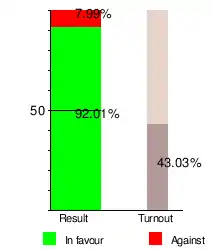
| Choice | Votes | % |
|---|---|---|
| 2,044,038 | 92.01 | |
| No | 177,547 | 7.99 |
| Valid votes | 2,221,585 | 97.17 |
| Invalid or blank votes | 64,632 | 2.83 |
| Total votes | 2,286,217 | 100.00 |
| Registered voters and turnout | 5,313,564 | 43.03 |
| Source: Government of Catalonia[1] | ||
The Catalan government estimated that polling stations representing up to 770,000 potential voters—14.5% of all registered voters—were closed down by police in raids, with any votes cast in those stations either seized, lost or inaccessible and therefore not counted.[23][24][25][184] Catalan government spokesman Jordi Turull argued that turnout would have been higher were it not for Spanish police suppression.[28] Catalan government officials argued that calculation by experts showed that without police pressure and closures, turnout could have reached up to 55%.[29]
Earlier in the day, a universal census was introduced, so any Catalan elector going out to vote could do so at any one of the still functioning polling stations.[26] Notorious examples of this included President Puigdemont himself—who voted in Cornellà del Terri instead of Sant Julià de Ramis where he was registered to vote, foiling a police operation to track him down along the way[185]—or Parliament of Catalonia Speaker Carme Forcadell.[186]
Results by province
| Province | Electorate | Turnout | Yes | No | |||
|---|---|---|---|---|---|---|---|
| Votes | % | Votes | % | ||||
| Barcelona | 3,971,666 | 41.23 | 1,438,682 | 90.71 | 147,294 | 9.29 | |
| Girona | 496,167 | 53.32 | 249,483 | 96.00 | 10,382 | 4.00 | |
| Lleida | 298,140 | 52.83 | 146,583 | 95.14 | 7,485 | 4.86 | |
| Tarragona | 547,591 | 40.62 | 205,038 | 94.33 | 12,331 | 5.67 | |
| Catalans abroad | N/A | N/A | 4,252 | 98.72 | 55 | 1.28 | |
| Total | 5,313,564 | 43.03 | 2,044,038 | 92.01 | 177,547 | 7.99 | |
Results by vegueries
| Vegueria | Electorate | Turnout | Yes | No | |||
|---|---|---|---|---|---|---|---|
| Votes | % | Votes | % | ||||
| Alt Pirineu i Aran | 53,228 | 53.91 | 26,674 | 95.18 | 1,350 | 4.82 | |
| Barcelona | 3,605,651 | 39.54 | 1,239,232 | 89.93 | 138,759 | 10.07 | |
| Central Catalonia | 374,611 | 58.15 | 205,285 | 95.96 | 8,638 | 4.04 | |
| Girona | 487,217 | 53.25 | 244,758 | 96.02 | 10,140 | 3.98 | |
| Lleida | 245,266 | 52.12 | 118,799 | 94.98 | 6,274 | 5.02 | |
| Tarragona | 420,740 | 36.82 | 142,386 | 94.12 | 8,897 | 5.88 | |
| The Ebre Lands | 126,851 | 53.24 | 62,652 | 94.80 | 3,434 | 5.20 | |
| Catalans abroad | N/A | N/A | 4,252 | 98.72 | 55 | 1.28 | |
| Total | 5,313,564 | 43.03 | 2,044,038 | 92.01 | 177,547 | 7.99 | |
Alleged irregularities
Due in part to the deactivation and repeated blocking by the police of the computer programs used to implement universal census and result reporting,[187] some alleged irregularities were reported by Spanish media during the celebration of the referendum. Among them, people recorded voting more than once, votes made by non-Catalan people not included in the census or images of people voting several times, including journalists.[188][189] Other media reported the system did not validate the second attempt when voting, but it couldn't be confirmed that this system worked during the whole process.[27][190][191]
The Catalan government was not allowed to use the same ballot boxes used in other elections and referendums because they are owned by the Spanish government, so different ballot boxes were used,[192] those were described as translucent by some media and opaque by some others in contrast to the transparent ballot boxes used in elections.[15][193][194] Ballots and ballot boxes were transported together, which according to Spanish media raised doubts about whether those ballots were removed or not prior to the vote.[195][196] Another controversial footage shows ballot boxes placed in the street, where any person could submit their vote without census control.[197][198] According to a Catalan newspaper, a volunteer declared that it was "a symbolic vote" in Ramon i Cajal school, Barcelona, after Spanish police removed the ballot boxes at another nearby polling station.[196]
There was no electoral board as it dissolved itself on 22 September to avoid being fined by the Constitutional Court and the counting system was blocked by the Guardia civil following orders from the Catalan High Court Justice.[15][121] Guardia Civil also shut down a WordPress.com blog which alleged to be used as a voting system in the referendum, the Catalan government said they didn't know about its existence.[15][199]
The Spanish Government denounced that the rules of the referendum that were changed 45 minutes before opening.[200] The new rules included the universal census according to which any citizen could vote in any voting center even if it was not the one originally assigned. They also accepted the use of non-official ballots printed at home and made optional the requirement of using envelopes.[15]
Controversy over the results
The publication of the results generated controversy both for the lack of basic electoral warranties,[201] as for the lack of coherence between the results that were published after 95% of the votes had been tallied and the official results published five days later.[202][203]
One analyst said that the large pro-independence vote (90% by official estimates) could actually be a sign that many people did not vote at all, and that the referendum lacked the conditions for fairness.[204]
In 71 municipalities the number of "yes" votes tallied were more than the number of registered voters for those municipalities, which could be partly explained by the "universal census" system introduced earlier in the day allowing people to vote in a different poll station than the one they were assigned.[27]
The Civil Guard delivered a report to the Spanish High Court with recordings of conversations that allegedly demonstrate that "the results of the referendum were decided in the days leading up to its holding".[205][206]
In the elections of December 2017 called by Spanish Prime Minister, parties supporting independence got 47.5% of the votes, but due to the high level of participation that was 33,970 more votes than 'Yes' votes were cast during the referendum.[207]
Aftermath
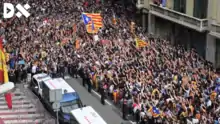
On 3 October 2017, Carles Puigdemont said that his government intends to act on the result of the referendum "at the end of this week or the beginning of next" and declare independence from Spain. Puigdemont would go before the Catalan Parliament to address them on Monday 9 October 2017, pending the agreement of other political parties.[208]
On 4 October 2017, Mireia Boya, a lawmaker of the Popular Unity Candidacy (CUP), announced that a declaration of independence would likely come after the parliamentary session on 9 October.[209]
The King of Spain, Felipe VI, called the Catalan referendum "illegal" and appealed to the union [of Spain], calling the situation "extremely serious".[210]
According to Swiss national radio, the Foreign Ministry of Switzerland has offered to mediate between the two sides in the crisis.[211] However, on 16 October 2017 the Foreign Ministry of Switzerland released a press note declaring that no formal offer was made, also stating that the independent aspirations in Catalonia are an internal affair of Spain and should be resolved within its constitutional order. It also made clear that Switzerland fully respects Spanish Sovereignty and that in any case any facilitation of the process could only take place in case that both sides requested it.[212]
Violence and injuries
The Spanish police and Guardia Civil mounted operations to close the polling stations. The security forces met resistance from citizens who obstructed their access to the voting tables; in Sant Julia de Ramis, where Puigdemont was expected to vote, they were joined by Corps of Firefighters of Catalonia members who formed a "human shield" separating the police from civilians to help obstruct their access to the polling station.[213][214] The police used force to try to reach the voting tables,[215] in some cases using batons against firefighters and civilians, and dragged some of them away.[214][216] The police made multiple charges.[217] In some other incidents the security forces were surrounded and driven out by the crowds. According to the Ministry of the Interior, rubber bullets (balls) were only used against demonstrators in one of those incidents in the Barcelona's Eixample district.[218][219] There were incidents at polling stations in Barcelona, Girona and elsewhere; the police forced entry to the premises, ejected the occupants and seized ballot boxes, some of them containing votes.[217]
The Spanish government endorsed the police actions ordered by the regional high court.[220] Carles Puigdemont accused Spanish authorities of "unjustified, disproportionate and irresponsible violence" and showing a "dreadful external image of Spain"[213] while Amnesty International and Human Rights Watch criticized what they called "excessive and unnecessary use of force" by the National Police and the Civil Guard.[45][46] The Spanish Coordinator for Prevention against Torture defined the police action as a "repression laboratory".[221] Spanish Supreme Court judge Pablo Llarena stated Puigdemont ignored the repeated warnings he received about the escalation of violence if the referendum was held.[47][48]
According to El País, after the first reports of violence, the government canceled the order given to the security forces, which pulled out early from the polling centers.[215] Catalan Ombudsman Rafael Ribó, said there was evidence Angela Merkel asked Mariano Rajoy to stop police violence.[222]
Various images and reports used to magnify the claims of police violence were circulated but were later found to be inaccurate or photoshopped,[223][224][225][226][227] and reports argued later that such posts, as well as conspiracy theories, had been amplified through the same network of social network profiles that had earlier promoted alt-right and pro-Putin views during earlier elections in Western countries.[228][229] A Republican Left of Catalonia (ERC) councillor accused the police of deliberately breaking her fingers one by one and of sexual abuse during a polling station evacuation, but later investigation disproved these statements.[225][230][231] A real picture of an elderly woman bleeding in the head as a consequence of a police charge was chosen as one of the "Bloomberg's 100 photos of the 2017".[232][233] The Spanish Ministry of the Interior instructed the Spanish Attorney General to investigate whether the accusations of police sexual abuse against protesters made by Mayor of Barcelona Ada Colau, who had mentioned the councilor's statements, could be considered a legal offense of slander against Spanish Law enforcement organisations.[234]
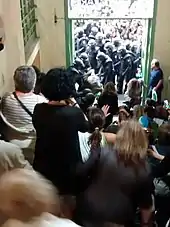
According to the judge, there were 218 persons injured on that day in the city of Barcelona alone, 20 of whom were agents.[40][41] According to various sources previously reported figures for civilians and police may have been exaggerated.[39] According to the Generalitat de Catalunya, 844 people requested the services of the Catalan emergency health service, this number includes people with irritation by gas and anxiety attacks. Of those injured, most were minor, but four people were hospitalised by the emergency health service and of those, two were in serious condition, one due to impact from a rubber ball in the eye in the protests, the other for unrelated causes.[217][235][236]
There was a police charge near school Ramon Llull. When police officers tried to enter inside the polling station, voters responded with a sit-in protest to block their way in. Few minutes later more anti-riot police was deployed in the zone and they could find the way in after breaking the polling station door. Police officers confiscated the ballot boxes, some of them with votes inside. In their way out, voters blocked the passage of the police cars standing or sitting in front of the police vehicles.[237] Some of them harassing and throwing fences, umbrellas and other objects against the agents, among them the man who was subsequently injured in the eye.[238] The agents responded shooting rubber balls.[239][240][241] The man injured by the rubber ball lost the vision in one eye and he sued 3 members of the Spanish National Police, adducing that one shot him directly to his face.[242][243][244] One witness, the journalist who recorded the images, testified he saw that a police officer pointed and shot horizontally, directly against demonstrators at a distance not exceeding 15 meters, hitting and injuring the man in the eye, which can be seen in the footage; according to four witnesses, there was no unrest at the moment the police charge and shots took place.[245][246][219][242] 13 police officers are being investigated for their actions in that polling station, even though the agent that shot the rubber bullet has not been identified yet.[247]
Initially, the Ministry of the Interior said 431 agents were injured, 39 of them requiring immediate medical treatment and the remaining 392 having injuries from bruises, scrapes, kicks and/or bites.[248][249] After a question from Basque senator Jon Iñarritu some months later, the Spanish Ministry of the Interior recognised that the number was much lower and stated that the number of police officers injured was 111.[37] During the hearings of the trial of Catalonia independence leaders in February 2019, Saenz de Santamaría reduced that figure further to 93, down from the initial 400.[250] In a document given to the judge investigating the police action during the day of the referendum in Barcelona, Spanish police reported around 40 injuries, including officers who acted in Girona and Sabadell, which include a "trauma on a finger", a "twisted foot" and a "nose scratch". The Police didn't provide medical reports for some of them and didn't explain how they were produced.[251]
The Mossos d'Esquadra have been accused of failing to execute the direct order issued by the High Court of Justice of Catalonia and not closing the voting centers before the voting commenced, or not confiscating voting materials on the day of the poll.[252]
According to the final report by the Catalan Health Service (CatSalut) of the Generalitat, there were 1,066 people attended by the Catalan hospitals in connection with the Catalan Referendum: 966 on 1 October 2017 and 75 during 2–4 October. According to the severity, the reports indicates that 886 (=823+63) were categorised as mild, 173 (=163+10) as moderate and 7 (=5+2) as severe. On 20 October 2017, the last injured person left the hospital. Regarding the age distribution: 10,4% of them were elderly people (>65 years old) and 23 of them were over 79 years old. Also, 2.1% were underage, including 2 children under 11 years old. This figures include 12 police officers: 9 Policía Nacional, 2 Guardia Civil and 1 Mossos d'Esquadra.[253] [254] [255] The Catalan Health Officer is planning to sue the Partido Popular general coordinator, Mr Fernando Martínez-Maillo, for his qualification as a "great farce" of the total number of injured persons.[256]
On 19 February 2018, in the hearing for the injuries in the village of Castellgalí, a Guardia Civil policeman testified before the judge that he only found passive resistance, thus contradicting a Spanish police statement, which claimed that violence, kicks and spitting took place at that location.[257]
According to a 2020 study, the crackdown by the Spanish state on Catalan activists "increased public sympathy for independence for a short period, and heightened animosity towards actors perceived to be associated or complicit with the Spanish state."[258]
Economic effects
As of August 2017 the spread between Spanish 10-year government debt and German bonds was close to its narrowest in seven years; however, since the start of July the yield on the Catalan regional government's bonds had jumped by about 50 basis points,[259] signaling unease among investors in regards to the referendum issue.
Stratfor suggested financial market disruption is due to the political upheaval. Predrag Dukic, senior equity sales trader at CM Capital Markets Bolsa, wrote: "The independence movement seeks to paralyze the region with strikes, disobedience, etc., a nightmare scenario for what until yesterday seemed a strong Spanish economic recovery." Markus Schomer, chief global economist at PineBridge Investments, suggested that the uncertainty both in and outside of Spain has made it hard to price the scenarios into final markets so far. Further he commented a strong approval could result in a euro −0.0255% sell off, just as in the aftermath of the German federal election the previous week. "I don't think there is an immediate change coming from that referendum. It'll take quite a bit longer to assess where this is going and what this will mean, how the EU will react, how the Spanish government will react. So I don't think you'll see people adjusting their portfolios on Monday, but you could get the classic knee-jerk, risk-off reaction."[260]
Political effect
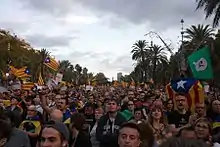
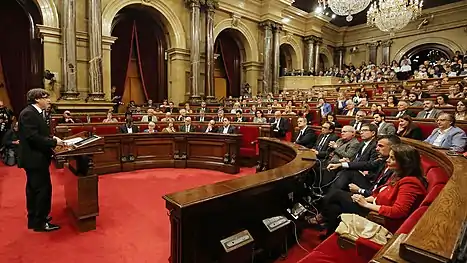
On 10 October in a speech in front of the Catalan parliament Puigdemont stated that he considered the referendum results to be valid and in consequence used the following wording: "I assume the mandate of the people for Catalonia to become an independent state in the shape of a republic", before adding that he would "ask Parliament to suspend the effects of the declaration of independence". In response the Central government made a formal request for him to answer before the Monday 16 October 2017 if he declared independence asking specifically for yes or no answer clarifying that any answer different than a "no" would be interpreted as a "yes".[261] Along with the formal request there was also an offer from the central government negotiated with the Spanish Socialist Workers' Party to evaluate the situation of Catalonia within Spain and to study possible reforms, if needed, to the Spanish Constitution.[262] On 16 October 2017 Puigdemont gave a response that did not address the issue of whether or not there had been a declaration of independence.[263][264] this triggered a second deadline of 10 am on Thursday 19 October for them to backtrack before direct rule was imposed.[265][266] The Spanish government subsequently offered to abort the suspension of self-rule if the Catalan government called for regional elections.[267] The response from Puigdemont to the second deadline was again not clear. Since he refused to abandon his independence push, on 21 October the Spanish government initiated the implementation of article 155 of the Spanish constitution.[268]
On 27 October 2017, the Parliament of Catalonia unilaterally declared independence from Spain. The proposal presented by the pro-independence political parties Junts pel Sí and Popular Unity Candidacy was approved with 70 votes in favor 10 against and 2 blank votes.[269][270] 55 MPs from the opposition refused to be present during the voting after the legal services of the Catalan Parliament advised that the voting could not take place as the law in which it was based had been suspended by the Constitutional Court.[271] Within hours, the Spanish Senate approved actions proposed by the Spanish government to invoke Article 155 and assume direct control over some of Catalonia's autonomous powers.[272] The measure was passed with 214 votes in favour, 47 against and 1 abstention. The measure is intended to be temporary; its claimed objective being to "re-establish the rule of law" and restore autonomy after new elections.[273][274] The first measures taken by Spanish Prime Minister Mariano Rajoy after the approval by the senate was to fire the Catalan President Carles Puigdemont and his cabinet, dissolving the Parliament of Catalonia and scheduling fresh Catalan elections on 21 December 2017.[275]
On 16 January 2018, the Spanish Constitutional Court issued a temporary restraining order regarding the work of the Catalan Government commission that investigates the violation of fundamental rights in Catalonia.[276]
Press coverage and Internet
Different sources describe aspects of the events differently according to their political stance. Notable examples include the coverage of Spanish TV channel TVE (Televisión Española) and Catalan channel TV3. TV3 covered the referendum and the police violence regularly while TVE mainly emphasised the Spanish government's position on its legality.[277] TVE media coverage was criticised by Televisión Española information council, calling for the resignation of the entire direction.[278] TV3 has been criticized both within and outside Catalonia as a mouthpiece for the independence movement.[279]
Various media reported on fake images of police violence against civilians that were posted in social networks.[280] They included images of people injured in other events, including footage from strikes and anti-austerity protests 4–5 years prior, Turkish police charges and protests by miners.[223][224][225] The news sites Okdiario and Periodista Digital were also accused of falsely trying to discredit some of those involved in police violence episodes.[281][282]
Some non-Spanish media outlets have criticized the Mariano Rajoy's government, police violence against civilians or Spain's media coverage, including The Guardian,[283] The Independent,[284] Al-Jazeera,[285] The Daily Telegraph,[286] and The New York Times.[287]
The Spanish newspaper El País argued that "the network of fake-news producers that Russia has employed to weaken the United States and the European Union is now operating at full speed on Catalonia",[288] involving a network of Russian media outlets and social network bots which, according to the argument, aimed to influence local and global discussion of events. Later investigations by Medium-DFRL said it found support for some but not all of the arguments made by Spanish outlets.[289] It is argued that the goal wasn't specifically to support Catalan independence but to "foment divisions to gradually undermine Europe's democracy and institutions"[290] and at discrediting Spanish legal and political authorities,[291] while Russian authorities have denied that Russian actors had any involvement.[291]
In popular culture
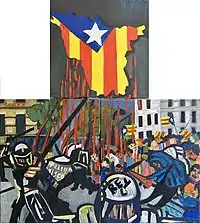
Several documentaries have been made about the day of the referendum, the most important ones being 1-O produced by Mediapro and El primer dia d'octubre produced by La Directa and released for free in YouTube.[292][293]
Many books about the topic were published as well, including Operació urnes ("Operation Ballot Boxes"), explaining how the ballot boxes were distributed around Catalonia, and Dies que duraran anys ("Days That Will Last for Years"), a photo book by Jordi Borràs. Those two being the first and the third top-sellers in the category of non-fiction in Catalan language during the Diada de Sant Jordi of 2018.[294]
Several Catalan groups also composed songs specially dedicated to that day, including Agafant l'horitzó (Catching the horizon) by Txarango and Rojos y separatistas (Red and separatists) by Lágrimas de Sangre.[295] Some international groups used images from the police violence during the day of the referendum in their concerts and music videos, including A Sound of Thunder and Steven Patrick Morrissey.[296][297]
On 15 June, the exhibition 55 Ballot Boxes for Freedom opened in Brussels, with artwork inspired by the ballot boxes of the Catalan referendum.[298][299]
Netflix used images from the police action during the day of the referendum to promote Black Mirror series in Spain.[300]
In 2020
In February 2020, Catalan nationalists and Spanish leaders came to negotiate on Catalonia's political future. Included in Catalan nationalists' two points was a retroactive legalization of the 2017 independence referendum. The terms have not been accepted but it is the beginning of open negotiations.[301] Fifteen representatives began talks with a discussion of the history of the Catalan crisis. Despite disagreement on when it began, the two sides concurred that the People's Party bore the overall responsibility in its fight against the Statute of Autonomy.[302] It was agreed that negotiations would continue, with plans for monthly meetings and plenary sessions every six months.[302] The COVID-19 pandemic cancelled these plans, but in September 2020, leaders discussed resuming negotiations.[303]
See also
- 2014 Scottish independence referendum
- 2017 Catalan regional election
- 2017 Kurdistan Region independence referendum
- 2018 New Caledonian independence referendum
- Catalan general strike
- Catalan independence
- Catalan nationalism
- Catalan Republic
- Declaration of Independence of Catalonia
- History of Catalonia
- Politics of Catalonia
- Catalan Revolt
Opinion poll sources
- "Participació del 60% i més avantatge del sí l'1-O". Ara (in Catalan). 16 September 2017.
- "La mayoría de los catalanes cree que el referéndum no se celebrará". La Razón (in Spanish). 16 August 2017.
- "Encuesta NC Report". La Razón (in Spanish). 16 August 2017. Archived from the original on 16 August 2017. Retrieved 16 August 2017.
- "La pressió de l'Estat no fa perdre suports a l'1-O ni a la independència". Ara (in Catalan). 24 July 2017.
- "Baròmetre d'Opinió Política. 2a onada 2017" (PDF). CEO (in Catalan). 21 July 2017. Archived from the original (PDF) on 9 September 2017. Retrieved 21 July 2017.
- "Baròmetre d'Opinió Política. 2a onada 2017 - REO 857" [Political Opinion Barometer. 2nd wave 2017 - REO 857]. CEO (in Catalan, Spanish, and English). 21 July 2017. Archived from the original on 24 July 2017. Retrieved 21 July 2017.
- "Referéndum: La mayoría dice no a la "república catalana"". La Razón (in Spanish). 3 July 2017.
- "Encuesta NC Report". La Razón (in Spanish). 3 July 2017. Archived from the original on 9 September 2017. Retrieved 3 July 2017.
- "El 54% de los catalanes está dispuesto a participar en una consulta unilateral". La Vanguardia (in Spanish). 2 July 2017.
- "El 65,4% de los catalanes que han decidido ir a las urnas el 1-O votará sí a la independencia". El Confidencial (in Spanish). 3 July 2017.
- "Primera encuesta sobre el referéndum catalán: participación del 64% y ventaja para el 'sí'". Ara (in Spanish). 18 June 2017.
- "Baròmetre d'Opinió Política. 1a onada 2017" (PDF). CEO (in Catalan). 30 March 2017. Archived from the original (PDF) on 7 April 2017. Retrieved 12 April 2017.
- "Huge upsurge in support for independence is revealed in world exclusive final Catalan poll". The National. 3 September 2017.
- "El 60% de los catalanes quiere participar en el referéndum del 1-O". eldiario.es (in Spanish). 17 September 2017.
- "El 'sí' ganará con un 72% y un 50% de participación si se celebra el referéndum". El Español (in Spanish). 5 September 2017.
- "El 50,1% de los catalanes está a favor de la independencia, el 45,7% en contra". El Español (in Spanish). 3 September 2017.
- "El referéndum unilateral pierde apoyos frente a la consulta acordada". La Vanguardia (in Spanish). 17 April 2017.
- "La mayoría quiere un referéndum pactado y descarta la unilateralidad". La Vanguardia (in Spanish). 9 January 2017.
- "El 82,2% aprueba la oferta de diálogo del Gobierno a la Generalitat". La Razón (in Spanish). 27 December 2016.
- "Apoyo a más financiación y mayor autogobierno" (PDF). La Razón (in Spanish). 27 December 2016. Archived from the original (PDF) on 28 March 2017. Retrieved 27 March 2017.
- "Enquesta sobre context polític a Catalunya. 2016" (PDF). CEO (in Catalan). 29 December 2016. Archived from the original (PDF) on 30 December 2016. Retrieved 27 March 2017.
- "El referéndum unilateral de independencia divide a los catalanes". El Periódico de Catalunya (in Spanish). 17 December 2016.
- "Baròmetre d'Opinió Política 39. 3a onada 2016" (PDF). CEO (in Catalan). 18 November 2016. Archived from the original (PDF) on 24 September 2017. Retrieved 27 March 2017.
- "Sondeig d'opinió Catalunya 2016" (PDF). ICPS (in Catalan). 17 October 2016.
- "La mitad de los catalanes cree que el Parlament se someterá al TC". La Razón (in Spanish). 12 August 2016.
- "Baròmetre d'Opinió Política 38. 2a onada 2016" (PDF). CEO (in Catalan). 22 July 2016. Archived from the original (PDF) on 7 August 2016. Retrieved 27 March 2017.
- "La mayoría apuesta por mejorar el autogobierno y aparcar la separación". La Vanguardia (in Spanish). 19 June 2016.
- "Baròmetre d'Opinió Política 37. 1a onada 2016" (PDF). CEO (in Catalan). 18 March 2016. Archived from the original (PDF) on 2 October 2017. Retrieved 27 March 2017.
- "La gran mayoría de los catalanes pide no apoyar a Mas". La Razón (in Spanish). 3 January 2016.
- "¿Cree que se deberían repetir las elecciones al Parlament de Cataluña?" (PDF). La Razón (in Spanish). 3 January 2016. Archived from the original (PDF) on 13 March 2017. Retrieved 27 March 2017.
- "Ciudadanos disputaría la victoria a ERC si se adelantan las elecciones en Cataluña". El Confidencial (in Spanish). 6 December 2015.
- "El no a la independencia vuelve a cobrar ventaja". La Vanguardia (in Spanish). 29 November 2015.
- "Enquesta sobre context polític a Catalunya. 2015" (PDF). CEO (in Catalan). 2 December 2015. Archived from the original (PDF) on 8 December 2015. Retrieved 27 March 2017.
- "Baròmetre d'Opinió Política 36. 3a onada 2015" (PDF). CEO (in Catalan). 13 November 2015. Archived from the original (PDF) on 28 March 2017. Retrieved 27 March 2017.
- "Empate técnico entre partidarios y contrarios a la independencia". La Vanguardia (in Spanish). 20 September 2015.
- País, El (18 September 2015). "Intención de voto en Cataluña". El País (in Spanish).
- "Sólo un 16% de catalanes cree que una declaración de independencia es la solución". El Confidencial (in Spanish). 19 September 2015.
- "Un 46% de los catalanes, en contra de la independencia". El Mundo (in Spanish). 7 September 2015.
- "La cuestión independentista". El Mundo (in Spanish). 7 September 2015.
- "Casi el 40% apoya reformar la Constitución como salida". La Vanguardia (in Spanish). 12 July 2015.
- "Baròmetre d'Opinió Política 35. 2a onada 2015" (PDF). CEO (in Catalan). 3 July 2015. Archived from the original (PDF) on 4 July 2015.
- "Los catalanes exigen una mayoría muy reforzada para la independencia". La Vanguardia (in Spanish). 2 May 2015.
- "Baròmetre d'Opinió Política 34. 1a onada 2015" (PDF). CEO (in Catalan). 13 March 2015. Archived from the original (PDF) on 2 April 2015. Retrieved 27 March 2017.
- "Enquesta sobre context polític a Catalunya. 2014" (PDF). CEO (in Catalan). 19 December 2014. Archived from the original (PDF) on 19 December 2014. Retrieved 27 March 2017.
- "Sondeig d'opinió Catalunya 2014" (PDF). ICPS (in Catalan). 6 December 2014.
- "La mayoría ve el plan independentista de Mas perjudicial para la economía". La Vanguardia (in Spanish). 8 December 2014.
- "Baròmetre d'Opinió Política 39. 3a onada 2016". El Mundo (in Spanish). 24 November 2014.
- "EXCLUSIVA enquesta Gesop: el 46,2% dels catalans votarien avui a favor de la independència". CEO (in Catalan). 30 October 2014.
- "Baròmetre d'Opinió Política 33. 2a onada 2014" (PDF). CEO (in Catalan). 31 October 2014. Archived from the original (PDF) on 31 October 2014. Retrieved 28 March 2017.
- "La secesión divide a los catalanes..." El Mundo (in Spanish). 1 September 2014.
- "Empate entre partidarios y contrarios a la independencia". La Vanguardia (in Spanish). 12 May 2014.
- "Baròmetre d'Opinió Política 32. 1a onada 2014" (PDF). CEO (in Catalan). 30 April 2014. Archived from the original (PDF) on 8 December 2015.
- "La mayoría de catalanes creen que no habrá referendo el 9-N". El Periódico de Catalunya (in Spanish). 9 March 2014.
- "El 74% de los catalanes reclaman a Rajoy que autorice la consulta". El Periódico de Catalunya (in Spanish). 15 December 2013.
- "Empate entre partidarios y contrarios a la independencia". La Vanguardia (in Spanish). 22 December 2013.
- "Baròmetre d'Opinió Política 31. 3a onada 2013" (PDF). CEO (in Catalan). 22 November 2013. Archived from the original (PDF) on 8 December 2015.
- "La opción 'más autogobierno' iguala en apoyo a la independencia". El Periódico de Catalunya (in Spanish). 28 October 2013.
- "Sondeig d'opinió Catalunya 2013" (PDF). ICPS (in Catalan). 10 October 2013.
- "Baròmetre d'Opinió Política 30. 2a onada 2013" (PDF). CEO (in Catalan). 20 June 2013. Archived from the original (PDF) on 8 December 2015.
- "Baròmetre polític de Catalunya. Maig 2013" (PDF). El Periódico de Catalunya (in Catalan). 8 June 2013.
- "Baròmetre d'Opinió Política 29. 1a onada 2013" (PDF). CEO (in Catalan). 21 February 2013. Archived from the original (PDF) on 8 December 2015.
- "La mayoría de los catalanes están a favor de la consulta". El Periódico de Catalunya (in Spanish). 20 January 2013.
- "Sondeig d'opinió Catalunya 2012" (PDF). ICPS (in Catalan). 20 December 2012.
- "El pacto fiscal sigue imponiéndose a la independencia, que se estanca". La Vanguardia (in Spanish). 18 November 2012.
- "El pacto fiscal se impone a la independencia, que pierde apoyo". La Vanguardia (in Spanish). 11 November 2012.
- "Baròmetre d'Opinió Política 28. 3a onada 2012" (PDF). CEO (in Catalan). 8 November 2012. Archived from the original (PDF) on 29 March 2017. Retrieved 28 March 2017.
- "El pacto fiscal neutralizaría la mayoría independentista". La Vanguardia (in Spanish). 28 October 2012.
- "El 65% ve viable la independencia pero entiende el temor empresarial". La Vanguardia (in Spanish). 14 October 2012.
- "El 84% de los catalanes apoya una consulta y el 55%, la independencia". La Vanguardia (in Spanish). 30 September 2012.
- "Baròmetre d'Opinió Política 27. 2a onada 2012" (PDF). CEO (in Catalan). 27 June 2012. Archived from the original (PDF) on 13 September 2012. Retrieved 28 March 2017.
- "Baròmetre d'Opinió Política 26. 1a onada 2012" (PDF). CEO (in Catalan). 2 March 2012. Archived from the original (PDF) on 4 October 2017. Retrieved 28 March 2017.
- "Sondeig d'opinió Catalunya 2011" (PDF). ICPS (in Catalan). 27 October 2011. Archived from the original (PDF) on 16 July 2015.
- "Baròmetre d'Opinió Política 25. 3a onada 2011" (PDF). CEO (in Catalan). 25 October 2011. Archived from the original (PDF) on 29 March 2017. Retrieved 28 March 2017.
- "Baròmetre d'Opinió Política 24. 2a onada 2011" (PDF). CEO (in Catalan). 29 June 2011. Archived from the original (PDF) on 15 September 2011. Retrieved 28 March 2017.
- "El apoyo a la independencia remite y cae al 40%, frente al 45% en contra". La Vanguardia (in Spanish). 7 September 2010.
- País, El (22 September 2017). "Sondeo sobre el referéndum en Cataluña". El País (in Spanish).
- "Referéndum: apoyo del 71,9% en Catalunya y rechazo del 61,5% en el resto de España". El Periódico de Catalunya (in Spanish). 25 February 2017.
- "El 76,3% de los que no votaron el 9-N no quiere la independencia". La Razón (in Spanish). 16 November 2014.
References
- "Catalan referendum results". Government of Catalonia. 2 October 2017. Archived from the original on 6 October 2017. Retrieved 3 October 2017.
- Giles, Ciaran; Parra, Aritz (17 October 2017). "Spain: Top court officially rules Catalan referendum illegal". Chicago Tribune. Retrieved 20 October 2017.
- "El gobierno de Cataluña convocó para el 1 de octubre el referéndum de autodeterminación". Infobae (in Spanish). 6 September 2017. Retrieved 20 October 2017.
- Jones, Sam (6 September 2017). "Catalonia to hold independence vote despite anger in Madrid". The Guardian. Retrieved 16 October 2017.
- "Why the referendum on Catalan independence is illegal". The Economist. 26 September 2017.
- "How to Stage an Illegal Referendum". Bloomberg.com. 20 September 2017.
- Alandete, David (10 October 2017). "Independence in Catalonia – now what?". El País.
- "Spain Catalonia: Court blocks independence referendum". BBC News. 8 September 2017. Retrieved 18 October 2017.
- "Recurso de inconstitucionalidad n.º 4334-2017, contra la Ley del Parlamento de Cataluña 19/2017, de 6 de septiembre, del Referéndum de Autodeterminación" (PDF) (in Spanish). Agencia Estatal Boletín Oficial del Estado. 6 September 2017. Retrieved 5 October 2017.
- Duarte, Esteban (11 September 2017). "Catalan Separatists Plot Show of Force in Battle With Madrid". Bloomberg. Retrieved 13 September 2017.
- Carranco, Rebeca; García, Jesús (21 September 2017). "La justicia desmonta la organización del referéndum ilegal de Cataluña". El País (in Spanish).
- "Una juez ordena a Google eliminar la aplicación sobre el referéndum catalán". Reuters (in Spanish).
- "Catalonia's Superior Court also orders Catalan Police to close off planned polling stations". El Nacional.
- Colomé, Jordi Pérez (3 October 2017). "La misión de observadores concluye que el referéndum no cumple los "estándares internacionales"". El País (in Spanish).
"La Misión debe concluir que el referéndum, tal y como se hizo, no puede cumplir con los estándares internacionales" The Mission must conclude that the referendum, as it was done, can not meet international standards
- "Did the referendum comply with basic voting regulations?". El País. 3 October 2017.
- Gallego-Díaz, Soledad (5 October 2017). "Mediaciones e instituciones". Hoy por hoy (in Spanish). Cadena SER.
- "Catalonia to hold independence vote despite anger in Madrid". The Guardian. 6 September 2017. Retrieved 20 October 2017.
The Catalan government has not set a threshold for minimum turnout, arguing the vote will be binding regardless of the level of participation.
- Jones, Sam (10 September 2017). "Catalans to celebrate their national day with independence protests". Theguardian.com. Retrieved 18 September 2017.
- "Spain just declared Catalan referendum law void". The Independent. 17 October 2017.
- "Catalonia plans an independence vote whether Spain lets it or not". The Economist.
- "Catalan independence referendum". The Daily Star. 10 October 2017.
- Ríos, Pere (6 September 2017). "Las diez claves de la ley del referéndum de Cataluña". El País. Retrieved 30 September 2017.
- "El Govern anuncia un 90% de 'síes' entre las 2.262.424 papeletas contadas y asegura haber escrutado el 100,88% de votos" (in Spanish). El Mundo. 2 October 2017. Retrieved 3 October 2017.
- "Catalan independence referendum: Region votes overwhelmingly for independence from Spain". The Independent. 2 October 2017.
- Hilary Clarke; Isa Soares; Vasco Cotovio (2 October 2017). "Catalonia referendum plunges Spain into political crisis". CNN. Retrieved 4 October 2017.
- "El independentismo, en númerus clausus" (in Spanish). El Periódico de Catalunya. 3 October 2017. Retrieved 4 October 2017.
- "El 'sí' obtuvo más votos que personas censadas en 71 municipios" (in Spanish). El País. 3 October 2017.
- Hilary Clarke, Isa Soares and Vasco Cotovio (2 October 2017). "Catalonia referendum plunges Spain into political crisis". CNN. Retrieved 4 October 2017.
Turnout was about 42% of the 5.3 million eligible voters... Turull said more people would have voted had it not been for Spanish police suppression. Up to 770,000 votes were lost as a result of the crackdowns at police stations, the Catalan government estimated.
- Gerard Pruina (2 October 2017). "El 'sí' a la independència s'imposa amb 2.020.144 vots, el 90%". Ara.Cat. Retrieved 4 October 2017.
Els encarregats de donar els resultats des del Centre Internacional de Premsa, el vicepresident, Oriol Junqueras; el conseller de la Presidència, Jordi Turull, i el conseller d'Exteriors, Raül Romeva, han remarcat contínuament que, tot i que els 2.248.000 vots no suposen 'per se' el 50% del cens, els càlculs dels experts apunten que sense pressió policial i tancament de col·legis s'hauria pogut arribar al 55% de participació.
- "Los Mossos cerraron más colegios el 1-O". La Vanguardia. 6 October 2017. Retrieved 13 February 2019.
- Erickson, Amanda (30 September 2017). "Catalonia independence vote: What you need to know". Washington Post. Retrieved 2 October 2017.
- "Iceta pide a los catalanes que no acudan a votar para no "dar valor" al referéndum". ABC (in Spanish).
- Molpeceres, Diego. "Referéndum en Cataluña - Un referéndum sin campaña por el 'no' a la independencia". Vozpópuli (in Spanish).
- "1-O.La pasividad de los Mossos y las posteriores cargas policiales marcan un día de tensión con votaciones sin garantías" (in Spanish). Eldiario.es. 1 October 2017. Retrieved 3 October 2017.
- "Policías y guardias realizan cargas ante la pasividad de los Mossos y dejan más de 893 heridos el 1-O" (in Spanish). El Mundo. 2 October 2017. Retrieved 3 October 2017.
- Giles, Aritz Parra and Ciaran (2 October 2017). "Catalonia urges mediation with Spain in secession dispute". AP – via www.washingtonpost.com.
- Serra, Ot (20 April 2018). "El govern espanyol va quadruplicar la xifra d'agents ferits l'1-O". Ara (in Catalan). Retrieved 26 April 2018.
- RESPUESTA D EL GOBIERNO 684/37958 (Report) (in Spanish). Senado. 22 March 2018. Retrieved 20 April 2018.
En relación con la pregunta de referencia, se informa que 111 miembros de las Fuerzas y Cuerpos de Seguridad del Estado fueron contusionados
- Iglesias, Leyre (9 October 2017). "Contamos como agresiones hasta las ansiedades por ver las cargas por televisión". El Mundo (in Spanish). Retrieved 11 October 2017.
- "Juez contabiliza 218 heridos en las cargas policiales en Barcelona el 1-O". La Vanguardia. EFE. 10 October 2017. Retrieved 11 October 2017.
- Requeijo, Alejandro (6 October 2017). "El juez que investiga las cargas policiales: "No era ilegal" votar el 1-O". El Español (in Spanish). Retrieved 11 October 2017.
- "Report on the incidents that took place from the 1st to the 4th of October 2017" (PDF). Catalan Health Service, Generalitat de Catalunya. 20 October 2017.
- "UN human rights chief urges probe into violence during referendum in Catalonia". United Nations. UN News Center. 2 October 2017. Retrieved 3 October 2017.
- "The Latest: UN chief hopes sides will solve Catalan crisis". CNBC. 2 October 2017.
- "Spain: Excessive use of force by National Police and Civil Guard in Catalonia". Amnesty International. 3 October 2017. Retrieved 10 October 2017.
- "Spain: Police Used Excessive Force in Catalonia". Human Rights Watch. 12 October 2017. Retrieved 16 June 2018.
- "La euroorden señala que Puigdemont obvió los avisos de que el 1-O provocaría una escalada de violencia". ABC. 30 March 2018.
- "El juez Llarena recalca en la orden de detención que Puigdemont ignoró los avisos de escalada de violencia". El Mundo. 30 March 2018.
- "Siete jueces investigan a los Mossos por desobediencia al no frenar el 1-O" (in Spanish). El Periódico de Catalunya. 2 October 2017. Retrieved 3 October 2017.
- "Spanish judge calls on Catalan police chief to testify in sedition probe". EFE. 4 October 2017. Retrieved 4 October 2017.
- Presno Linera, Miguel Ángel (3 October 2018). "La proporcionalidad policial el 1-O". Agenda Pública (in Spanish). Retrieved 20 June 2018.
- "Catalan Parliament Votes Yes to Independence Referendum Next September". 6 October 2016. Retrieved 30 March 2017.
- Prim, Sara (28 September 2016). "Puigdemont to call a referendum next September if Spain doesn't allow Catalans to vote". Catalan News Agency. Retrieved 2 October 2016.
- "Parliament approves calling a referendum with or without Spain's consent". Catalan News Agency. 7 October 2016. Retrieved 8 October 2016.
- Calvo, Amanda (6 October 2016). "Catalan parliament votes yes to independence referendum next September". Reuters. Retrieved 8 October 2016.
- Barcelona, Europa Press. "Puigdemont y Junqueras viajan a Bruselas este martes para defender un referéndum pactado". heraldo.es. Retrieved 23 June 2017.
- "Puigdemont: "Europe cannot look the other way"". Catalan News Agency. 25 January 2017. Retrieved 25 January 2017.
- "Puigdemont on the referendum: 'Europe cannot look the other way and should be part of the solution'". VilaWeb. 25 January 2017. Retrieved 25 January 2017.
- "MEPs from fourteen countries and all political groups attend hearing with Puigdemont, Junqueras and Romeva in Brussels". VilaWeb. 25 January 2017. Retrieved 25 January 2017.
- "The Catalan Referendum conference". YouTube. 10 February 2017. Retrieved 27 March 2017.
- Casqueiro, Javier (9 June 2017). "Catalan independence referendum to be held on October 1: regional premier". elpais.com. Retrieved 29 June 2017.
- News, ABC. "Catalan parliament paves the way for independence vote". ABC News. Archived from the original on 6 September 2017. Retrieved 6 September 2017.
- Bustos, Jorge (16 April 2018). "Cristóbal Montoro: "Acepto que al PP le pasa algo, pero su problema no es Rajoy"". El Mundo (in Spanish). Madrid. Retrieved 16 April 2018.
- Orriols, Núria (7 October 2017). "Les urnes: quatre mesos de viatge fins a l'1-O". Diari Ara (in Catalan). Barcelona. Retrieved 11 April 2018.
- G. Sastre, Daniel (22 March 2017). "El Parlament aprueba los Presupuestos del referéndum al borde del motín". El Mundo (in Spanish). Barcelona. Retrieved 30 March 2017.
- Cordero, Dani (23 March 2017). "Puigdemont prepara la maquinaria electoral para unas autonómicas". El País (in Spanish). Barcelona. Retrieved 27 March 2017.
- Barrena, Xabi; Masreal, Fidel (23 March 2017). "El Govern activa los trámites para poder hacer el referéndum". El Periódico de Catalunya (in Spanish). Barcelona. Retrieved 27 March 2017.
- Barrena, Xabi; Albalat, J.G. (24 March 2017). "La fiscalía investiga si el Govern está preparando el referéndum". El Periódico de Catalunya (in Spanish). Barcelona. Retrieved 30 March 2017.
- Aroca, Jaume. "Se buscan los datos de 5,5 millones de catalanes para el Referéndum". lavanguardia.com (in Spanish). Retrieved 30 June 2017.
- Casqueiro, Javier; Cordero, Dani (26 June 2017). "Catalan government fails to mobilize region's expats in run-up to referendum". elpais.com. Retrieved 29 June 2017.
- Cordero, Dani; Rios, Pere. "Puigdemont cessa Baiget pels seus dubtes sobre el referèndum". elpais.com (in Catalan). Retrieved 4 July 2017.
- Piñol, Àngels. "Junqueras liderarà el referèndum després d'imposar un Govern de fidels". elpais.com (in Catalan). Retrieved 14 July 2017.
- Duarte, Esteban. "Catalan Police Chief Resigns as Referendum on Secession Looms". bloomberg.com. Retrieved 17 July 2017.
- "El director del 112 Fede Adan también dimite tras la renuncia de Jané y Batlle". lavanguardia.com (in Spanish). Retrieved 21 July 2017.
- "La 'número dos' de Enseñanza dimite a una semana del relevo de la consellera". elmundo.es (in Spanish). Retrieved 21 July 2017.
- Masreal, Fidel. "Tercera baja en la Conselleria d'Ensenyament por el Referéndum del 1-O". elperiodico.com (in Spanish). Retrieved 21 July 2017.
- "Referéndum: Dimite Ángel Xifré, el primer alto cargo de ERC". lavanguardia.com (in Spanish). Retrieved 26 July 2017.
- Blanchar, Clara. "El Govern cesa al presidente del Consorcio de Educación de Barcelona en plena búsqueda de locales". elpais.com (in Spanish). Retrieved 13 September 2017.
- "El Constitucional suspende de urgencia la ley del referéndum" (in Spanish). El País. 8 September 2017. Retrieved 12 September 2017.
- "Más de 700 ayuntamientos confirman que colaborarán en el 1-O, a la espera de Barcelona" (in Spanish). La Vanguardia. 9 September 2017. Retrieved 12 September 2017.
- ACN, ed. (21 September 2017). "Més de 150 persones es manifesten a favor de la Guàrdia Civil a la caserna de Travessera de Gràcia" [More than 150 people demonstrate in favour of the Spanish Civil Guard in the headquarters in Gracia]. El Món (in Catalan). Barcelona. Archived from the original on 21 September 2017. Retrieved 23 September 2017.
- Penty, Charles. "Catalonia Secessionists Fail to Win Allies in Referendum Battle". Bloomberg. Retrieved 9 September 2017.
- "Colau y Domènech advierten a JxSí de que no aceptarán "más lecciones de desobediencia"" (in Spanish). La Vanguardia. 11 September 2017. Retrieved 12 September 2017.
- Jones, Sam; Burgen, Stephen (21 September 2017). "Spain crisis: 'stop this radicalism and disobedience,' PM tells Catalan leaders". The Guardian. Madrid/Barcelona. Retrieved 22 September 2017.
- Stone, Jon (20 September 2017). "Spanish police storm Catalan government buildings to stop independence referendum". Independent. Retrieved 22 September 2017.
- "The "Jordis" are not political prisoners – here's why". El País. 18 October 2017. Retrieved 22 October 2017.
- "Desvelan las 6 llamadas de auxilio de la Guardia Civil a los Mossos". Antena 3 (in Spanish). 6 October 2017. Retrieved 10 October 2017.
- Mowat, Laura (21 September 2017). "Spain in Crisis: Troops sent in as 40,000 protest over 'War' on Catalan independence vote". Express (newspaper). Retrieved 22 September 2017.
- Badcock, James (4 October 2017). "Catalonia's police chief faces sedition charge for 'allegedly failing to follow orders' ahead of referendum". The Telegraph. Retrieved 10 October 2017.
- Peral, María (15 October 2017). "El testimonio que puede llevar a prisión a Trapero: "Sentí terror y humillación"". El Español (in Spanish). Retrieved 1 November 2020.
- Pinheiro, Marcos (17 October 2017). "Las claves del auto de Sànchez y Cuixart: actuaron contra la Guardia Civil para "proteger" a altos cargos". eldiario.es (in Spanish).
- "La Fiscalía pedirá investigar por sedición los disturbios en Cataluña". eldiario.es (in Spanish). 22 September 2017. Retrieved 20 October 2017.
- "Reparar los vehículos de la Guardia Civil destrozados en Barcelona costó 135.632 euros". Heraldo.es. 10 October 2017.
- "La jueza deja en libertad al mayor Trapero pero le impone medidas cautelares". Cadena Ser. 16 October 2017.
- "Trapero defensa que els Mossos no van ser avisats del dispositiu amb prou temps". Diari de Girona (in Catalan). 7 October 2017. Retrieved 11 April 2018.
- "Catalonia: Spanish judge jails two independence leaders for possible sedition". Independent. 16 October 2017. Retrieved 20 October 2017.
- Strange, Hannah (16 October 2017). "Two Catalan independence leaders taken into custody by Spanish national court". The Telegraph. Retrieved 20 October 2017.
- Lucas-Torres, Carmen; Requeijo, Alejandro; Peral, María; Montero, Daniel (16 October 2017). "Los 'Jordis' a prisión por "alentar a la masa" contra la Guardia Civil el 20-S". El Español (in Spanish). Retrieved 21 October 2017.
- "¿Qué es el delito de sedición? Así lo regula el Código Penal". El Periódico (in Spanish). 17 October 2017. Retrieved 27 October 2017.
- "Criminal Code Organic Law of 1995". Organic Law No. 10 of 23 November 1995. Official State Gazette (in Spanish). Retrieved 28 October 2017.
- "Un vídeo muestra cómo Cuixart y Sànchez intentaron disolver la manifestación de Economia". La Vanguardia. Retrieved 18 October 2017.
- "Spain: charges for sedition and pre-trial detention against Jordi Cuixart and Jordi Sanchez are excessive". Amnesty International. Retrieved 18 October 2017.
- Penty, Charles (21 September 2017). "Spain Hires Cruise Liner to House Police in Rebel Catalonia". Bloomberg News. Barcelona. Retrieved 22 September 2017.
- "Mapa convocatorias protesta contra la detención de los 14 cargos de la Generalitat". El público. Retrieved 23 September 2017.
- "Miles de personas se manifiestan por toda España contra el referéndum del 1-O". El Confidencial (in Spanish). 30 September 2017. Retrieved 5 October 2017.
- "Protestas en toda España contra el referéndum del 1-O" (in Spanish). Levante-EMV. 30 September 2017. Retrieved 5 October 2017.
- "Miles de personas se manifiestan por la unidad de España en Barcelona". Cadena SER (in Spanish). 30 September 2017. Retrieved 5 October 2017.
- "Vítores en la salida de los guardia civiles a Cataluña" (in Spanish). La Verdad (Murcia). 27 September 2017. Retrieved 5 October 2017.
- "Miembros de la Guardia Civil, vitoreados en su salida hacia Catalunya". La Vanguardia (in Spanish). 25 September 2017. Retrieved 5 October 2017.
- "Banderas de España y gritos de apoyo para despedir a los guardias civiles de Castellón enviados a Cataluña". El Mundo (in Spanish). 26 September 2017. Retrieved 5 October 2017.
- "VÍDEO La policia local de Vitòria desallotja un acte de la CUP sobre el referèndum". Nació Digital (in Catalan). 15 September 2017. Retrieved 14 September 2018.
- "El jutge sentencia que Anna Gabriel tenia dret a fer una conferència a Vitòria fa un any". Nació Digital (in Catalan). 14 September 2018. Retrieved 14 September 2018.
- Solé, Alba (25 September 2017). "La Guàrdia Civil tanca el web de l'ANC i 140 més sobre l'1-O". El Nacional. Retrieved 17 April 2018.
- "Internet Society statement on Internet blocking measures in Catalonia, Spain". Internet Society. 21 September 2017. Retrieved 17 April 2018.
- "La Guardia Civil ordenó a CDMON sobre las 17 horas cerrar la web del 1-O" (in Spanish). Europa Press. 13 September 2017. Retrieved 17 April 2018.
- "El TSJC ordena a Google retirar la app que informa sobre cómo y dónde votar el 1-O difundida por Puigdemont". La Vanguardia (in Spanish). 30 September 2017. Retrieved 17 April 2018.
- "APC calls for an end to restrictions on freedom of expression in Catalonia". Association for Progressive Communications. September 2017. Retrieved 17 April 2018.
- "No Justification for Spanish Internet Censorship During Catalonian Referendum". Electronic Frontier Foundation. 2 October 2017. Retrieved 17 April 2018.
- "Evidence of Internet Censorship during Catalonia's Independence Referendum". The Tor Project, Inc. 3 October 2017. Retrieved 17 April 2018.
- "Digital repression and resistance during the #CatalanReferendum". Xnet. 4 October 2017. Retrieved 17 April 2018.
- Jones, Sam (24 September 2017). "Catalan campaigners hand out a million referendum ballots". The Guardian.
- "La guia per a votar al referèndum del primer d'octubre" (in Catalan). VilaWeb. 1 October 2017. Retrieved 11 April 2018.
- González, Miguel (26 July 2017). "La ONU frena el intento de dar aval internacional al referéndum catalán". El País (in Spanish). Retrieved 30 September 2017.
- "El Parlamento Vasco muestra su apoyo al referéndum catalán". EITB. 28 September 2017. Retrieved 1 October 2017.
- "PNV y Bildu defienden en una manifestación en Bilbao el referéndum catalán". El Confidencial. 30 September 2017. Retrieved 5 October 2017.
- "Espaldarazo al referéndum catalán en Bilbao". EITB. 30 September 2017. Retrieved 5 October 2017.
- The communiqué published in Gara read that "the Spanish state is a prison for the people, and this is shown by denying the national identity of the Catalan countries. The Spanish state has also become a prison for democracy, since it has trampled on the rights of the Catalans;" see "Basque terrorist group ETA slams Madrid's opposition to Catalan independence vote". 27 September 2017. Retrieved 5 October 2017.
- "El Parlamento Vasco muestra su apoyo al referéndum catalán". EITB. 21 September 2017. Retrieved 1 October 2017.
- "Miles de personas se manifestan en Santiago en "solidaridad" con el referéndum catalán". EITB. 30 September 2017. Retrieved 5 October 2017.
- Europa Press (4 September 2017). "El PP exige a Carmena que prohíba el acto de apoyo al referéndum catalán por incluir una corona del revés en el cartel". El Diario. Retrieved 7 October 2017.
- Europa Press (15 September 2017). "El acto en Madrid pro referéndum se celebrará en un teatro privado". El Diario. Retrieved 7 October 2017.
- "El acto a favor de la consulta clama por el 1-O arropado por ERC, la CUP y Podemos". El Confidencial. 17 September 2017. Retrieved 7 October 2017.
- Luca Costantini (3 October 2017). "Carmena califica de "error terrible" la actuación policial en Cataluña". El País. Retrieved 7 October 2017.
- "Prime Minister of Belgium reacts on October 1, 2017". 1 October 2017. Retrieved 1 October 2017.
- "Plenković o Kataloniji: Osuđujemo nasilje".
- "Foreign Ministry Spokesperson Lu Kang's Regular Press Conference on September 28, 2017". Ministry of Foreign Affairs. People's Republic of China. Retrieved 1 October 2017.
- Salvado, Nico (16 June 2017). "Emmanuel Macron s'exprime au sujet de l'indépendance de la Catalogne" (in French). Equinox. Retrieved 20 September 2017.
- Sanchez, Rosalia (8 September 2017). "Alemania reclama respeto a la Constitución en Cataluña" (in Spanish). ABC. Retrieved 20 September 2017.
- "Aufwind für Separatisten in Katalonien" (in German). Berliner Morgenpost. 29 September 2015. Retrieved 20 September 2017.
- Barigazzi, Jacopo (18 September 2017). "Hungary to 'respect' will of people in Catalonia vote". Politico. Retrieved 20 September 2017.
- "Brussels MUST NOT ignore will of the people with Catalan independence vote warns Hungary". Daily Express. 18 September 2017. Retrieved 20 September 2017.
- Gudavičius, Stasys. "Prezidentė: referendumas Katalonijoje – nekonstitucinis, bet..."
- "Comparison of Catalonian, Baltic independence ideas wrong - Lithuanian Foreign Minister". Baltic Times. 29 September 2017. Retrieved 1 October 2017.
- "L. Linkevičius: lyginti Katalonijos ir Baltijos šalių nepriklausomybės idėjas būtų nekorektiška". DELFI (in Lithuanian). BNS. 28 September 2017. Retrieved 1 October 2017.
- "Ministro acredita que Espanha saberá resolver questão do referendo na Catalunha". SIC. 27 September 2017. Retrieved 28 September 2017.
- "Personalidades portuguesas lançam manifesto por uma "solução política negociada"". Diário de Notícias. 3 October 2017. Retrieved 3 October 2017.
- "Spanish authorities should begin dialogue with Catalans - Russian senator". TASS. 1 October 2017.
- "Serbia Foreign Minister Ivica Dacic: 'I hope the EU will survive until we're ready to join'". Ministry of Foreign Affairs (Serbia). 7 September 2017. Retrieved 30 September 2017.
- Johnson, Boris (1 October 2017). "twitter.com". @BorisJohnson. Retrieved 1 October 2017.
The Catalonian referendum is a matter for the Spanish govt & people. Imp that Spanish constitution respected & the rule of law upheld. (1/2)
- Piñol, Àngels (13 April 2017). "US snubs Catalan independence drive in latest setback for separatists". El País. Retrieved 20 September 2017.
- "Rajoy wins Trump support over Catalonia". euronews. 26 September 2017. Retrieved 27 September 2017.
- Gearan, Anne (26 September 2017). "Trump says U.S. opposes independence bid in Spain's Catalonia region". Washington Post. ISSN 0190-8286. Retrieved 27 September 2017.
- Mortimer, Caroline. "Catalan referendum: Jeremy Corbyn urges Theresa May to intervene 'to find political solution to the crisis'". The Independent. Retrieved 1 October 2017.
- Miliband, Ed [@Ed_Miliband] (1 October 2017). "The scenes from Catalonia are appalling. They go way beyond rights and wrongs of independence. The U.K. government cannot just stay silent" (Tweet). Retrieved 2 October 2017 – via Twitter.
- Gildernew, Michelle (12 September 2017). "Catalan independence referendum must be recognised internationally - Gildernew". Sinn Féin. Retrieved 20 September 2017.
- "Scottish Government release statement on Catalonia referendum". The Scotsman. 16 September 2017. Retrieved 20 September 2017.
- Jones, Carwyn (1 October 2017). "twitter.com". @fmwales. Retrieved 1 October 2017.
Horrific scenes on the streets of #Catalonia today. When violence replaces democracy and dialogue there are no winners.
- LeanneWood (1 October 2017). "Distancing myself from comments by @WelshGovernment & #Rhondda's MP on #Catalonia today. There's no equivalence -violence not on both sides!". @LeanneWood. Retrieved 1 October 2017.
- "There are two stories to be told today in Catalonia". Solidarity (Ireland). 1 October 2017. Retrieved 1 October 2017.
- "Catalonia referendum: Hundreds injured in clashes with police". The Irish Times. 1 October 2017. Retrieved 1 October 2017.
- "Solidarity with the Mayors of Catalonia from Mayor of the City of Dublin". 22 September 2017. Retrieved 26 September 2017.
- "17 folketingsmedlemmer går i forbøn for Catalonien" (in Danish). Berlingske. 15 September 2017. Retrieved 21 September 2017.
- Heine, Hannes (20 September 2017). "Europäische Linke verurteilt Verhaftungen in Katalonien" (in German). Der Tagesspiegel. Retrieved 21 September 2017.
- "Catalogna, Salvini: "Fanno come contro la Lega, è una vergogna" - Tgcom24". Retrieved 30 September 2017.
- "Referendum Catalogna è "una forzatura": Salvini rinnega il passato della Lega Nord "Non ci sono nostalgie per la Padania" - Il Fatto Quotidiano". 4 October 2017.
- "Salvini: a Barcellona le urne una forzatura Nessuno ha nostalgia della Padania". 3 October 2017.
- "El Gobierno sardo se ofrece a imprimir y custodiar papeletas". naiz.eus. 22 September 2017. Retrieved 26 September 2017.
- "Diputats sards demanen al seu govern que imprimeixi i guardi les butlletes pel referèndum català". VilaWeb.cat.
- "Arresti contro il referendum popolare, la Sardegna si schiera con la Catalogna - Regione - la Nuova Sardegna". 21 September 2017.
- "La Sardegna sostiene la Catalogna: "Il voto popolare non deve mai fare paura" - Cronaca - L'Unione Sarda.it". 22 September 2017.
- "Catalogna: odg Consiglio contro violenze". Ansa.it. 17 October 2017. Retrieved 29 October 2017.
- "Bourgeois oppert internationale bemiddeling in Catalaanse onafhankelijkheidskwestie". 20 September 2017. Retrieved 23 September 2017.
- "Des parlementaires suisses envoient une lettre sur la Catalogne à Madrid - rts.ch - Suisse". amp.rts.ch (in French). Retrieved 29 September 2017.
- "TEV-DEM تعلن تضامنها مع كتالونيا وتدعمها في استفتاءها - ANHA". www.hawarnews.com. Archived from the original on 29 September 2017. Retrieved 30 September 2017.
- Romero, Nazaret. "'Catalans have the right to self-determination', says speaker of the Slovenian Parliament". www.catalannews.com. Retrieved 30 September 2017.
- @beatrizbecerrab (7 September 2017). "Esta es la carta en la que Tajani me responde sobre el golpe en Cataluña. Mi carta era del 19 de junio, la respuesta ha llegado hoy" (Tweet) – via Twitter.
- @EU_Commission (14 September 2017). "@JunckerEU sur la Catalogne: la Commission respectera les arrêts de la Cour constitutionnelle espagnole & du Parlement espagnol #AskJuncker" (Tweet) – via Twitter.
- "Juncker on Catalan referendum, Brexit and tech giants". Euronews. 14 September 2017. Retrieved 20 September 2017.
- "European Commission - Press release - Statement on the events in Catalonia". europa.eu. 2 October 2017. Retrieved 5 October 2017.
- "Catalonia plans to hold an independence vote whether Spain lets it or not". The Economist. 12 July 2017. Retrieved 12 July 2017.
- González, Miguel (26 July 2017). "La ONU frena el intento de dar aval internacional al referéndum catalán" (in Spanish). El País. Retrieved 20 September 2017.
- "Media statement: Violation of the right of self-determination of the Catalan People". Alfred de Zayas' Human Rights Corner. 23 September 2017. Retrieved 25 September 2017.
- "Tensions grow in Spain as Catalonia independence referendum confirmed". The Daily Telegraph. 9 June 2017. Retrieved 10 July 2017.
- Isa Soares; Vasco Cotovio; Hilary Clarke (2 October 2017). "Catalonia referendum result plunges Spain into political crisis". CNN. Retrieved 2 October 2017.
- Mowat, Laura (2 October 2017). "Catalonia referendum: How Catalan president OUTFOXED Spanish police trying to block vote". Express. Retrieved 2 October 2017.
- ACN, ed. (2 October 2017). "Càrrega també al col·legi on vota Carme Forcadell" [Police charge also at the school where Carme Forcadell votes]. Diari de Girona (in Catalan). Retrieved 2 October 2017.
- "La Guardia Civil gana la guerra tecnológica al tumbar el 'censo universal'". Diario de León (in Spanish). Retrieved 11 October 2017.
- "Una periodista de laSexta comprueba cómo era posible votar varias veces en distintos colegios". La Sexta (in Spanish). 1 October 2017.
- "Irregularidades en el referéndum: gente que vota cuatro veces, votos 'extranjeros'..." (in Spanish). El Confidencial. 1 October 2017.
- "VÍDEO Comproven si es pot votar dues vegades al referèndum" (in Catalan). NacióDigital. Retrieved 4 November 2017.
- "Oriol de Balanzó, de 'La competència', intenta votar dos cops" (in Catalan). RAC1. Retrieved 4 July 2018.
- "El TSJC ordena a les policies locals vigilar les urnes de l'Estat". Nació Digital (in Catalan). 29 September 2017. Retrieved 11 May 2018.
- "El Gobierno catalán anuncia un censo universal para facilitar la votación". Reuters (in Spanish). 1 October 2017. Retrieved 11 May 2018.
- "Ja sabem com són les urnes del referèndum". RAC1 (in Catalan). 29 September 2017. Retrieved 11 May 2018.
- "La caída al suelo de una bolsa con una urna y papeletas de votación crea debate en las redes" (in Spanish). Europa Press. 1 October 2017.
- "1-O: una jornada procliu a les notícies falses". Diari Ara (in Catalan). 30 September 2018. Retrieved 7 October 2018.
- "Así es el referéndum: voto en plena calle y urnas que llegan llenas a los colegios". La Razón. October 2017.
- "Decenas de personas votan en la calle sin ningún tipo de control censal" (in Spanish). Antena 3.
- "La Guardia Civil cierra un blog para votar telemáticamente sin controlar los datos". El Confidencial. 1 October 2017. Retrieved 9 November 2017.
- "REFERÉNDUM DEL 1-O El Gobierno español da por "desbaratado" el referéndum tras el cambio de las normas a 45 minutos de la votación" (in Spanish). Deia. 1 October 2017.
- "El Govern proclama los resultados del referéndum saltándose la ley aprobada en el Parlament" (in Spanish). Eldiario.es. 6 October 2017.
- "Los resultados del referéndum ilegal publicados por el Govern no cuadran" (in Spanish). SER Catalunya. 6 October 2017.
- "¿Por qué no cuadran los resultados del referéndum del 1-O?" (in Spanish). El Periódico. 6 October 2017.
- Epatko, Larisa (4 October 2017). "What happened with Catalonia's vote for independence -- and what's next". PBS NewsHour. Retrieved 4 October 2017.
- "La Guardia Civil presenta grabaciones que demuestran que el resultado del 1-O estaba decidido previamente". Expansión. 12 October 2017. Retrieved 9 November 2017.
- "La estrategia del 1-O: "Si votan dos millones, se tiene que decir que habrían ido tres, pero nos boicotearon"". El Mundo. 12 October 2017. Retrieved 9 November 2017.
- Vicenç, Josep; Eres (6 January 2018). "Els escacs i les llegendes electorals del 21-D". El Núvol (in Catalan). Retrieved 13 May 2018.
- McKirdy, Euan; Vasco, Cotovio; Smith-Spark, laura. "Catalonia crisis deepens as independence declaration looms". CNN.com. CNN. Retrieved 4 October 2017.
- Berwick, Angus; Dowsett, Sonya. "Catalonia moves to declare independence from Spain on Monday". Reuters.com. Reuters. Retrieved 4 October 2017.
- "Catalunha vai declarar a independência "dentro de dias", diz Puigdemont" (in Portuguese). Diário de Notícias. 3 October 2017. Retrieved 4 October 2017.
- Rafael Minder (6 October 2017). "Catalonia Government Declares Overwhelming Vote for Independence". Retrieved 6 October 2017.
- "Suiza rechaza cualquier papel mediador en Cataluña". ABC (in Spanish). 16 October 2017.
- Jen Mills (1 October 2017). "Firefighters defend voters from riot police in Catalonia referendum". Metro.Co.Uk. Retrieved 9 October 2017.
- Richard A L Williams (1 October 2017). "Catalonia referendum: Firefighters attacked by Spanish police as they form human shield to protect voters". Independent.Co.Uk. Retrieved 9 October 2017.
- López-Fonseca, Óscar (2 October 2017). "Riot police operations called off early after outcry over violence in Catalonia". El País. Retrieved 3 October 2017.
- "Police vs firefighters: defining images of Catalan referendum". South China Morning Post. 2 October 2017. Retrieved 6 October 2017.
- Congostrina, Alfonso L.; Rodríguez, Marta (2 October 2017). "La Generalitat cifra en 844 los atendidos por heridas y ataques de ansiedad". El País (in Spanish). Retrieved 3 October 2017.
- "Denuncian la brutalidad policial en Aiguaviva, un pueblo de Girona: "Utilizaron gases. Se llevaron la urna y gritaron: ¡Viva España!"" [They denounce police brutality in Aiguaviva, a town from Girona: "They used gas. They took the ballot box and shout: ¡Viva España!"]. La Sexta (in Spanish). 1 October 2017. Archived from the original on 2 October 2017. Retrieved 3 October 2017.
- Solé Altimira, Oriol (24 April 2018). "Testigos aseguran ante el juez que un policía apuntó "de forma directa" al herido por bala de goma el 1-O". El Diario (in Spanish). Retrieved 16 June 2018.
- "Catalan referendum: 'Hundreds hurt' as police try to stop voters". BBC News. 1 October 2017.
- Riart, Montse (7 June 2018). "Les entitats acusen els cossos de seguretat de l'Estat d'utilitzar l'1-O com un "laboratori de la repressió"". Ara (in Catalan). Retrieved 16 June 2018.
- Rusell, Greg (15 June 2018). "Merkel told Rajoy 'Europe cannot accept' police brutality during independence referendum". The National. Retrieved 16 June 2018.
- "Violences policières en Catalogne : attention aux images trompeuses" (in French). Le Monde. 2 October 2017. Retrieved 4 October 2017.
- "Falsos heridos, banderas de Photoshop... Éstos fueron los bulos virales del 1-O" (in Spanish). El Mundo. 3 October 2017. Retrieved 4 October 2017.
- "Una ficción mucho más efectiva" (in Spanish). El Mundo. 4 October 2017. Retrieved 5 October 2017.
- "Las fotos virales del referéndum del 1-O que no te debes creer". El Huffington Post. 1 October 2017. Retrieved 13 February 2019.
- País, El (6 October 2017). "Fake images from the Catalan referendum shared on social media". Retrieved 13 February 2019 – via elpais.com.
- David Alandete (2 October 2017). "There's fake news in Catalonia too". El Pais. Retrieved 10 October 2017.
- Cazabulos, El. "No, la mujer a la que se llevó la Guardia Civil en volandas no se hizo una foto con Otegi". eldiario.es. Retrieved 13 February 2019.
- "La mujer que aseguró que le habían roto los dedos de una mano dice ahora que solo tiene una inflamación" (in Spanish). ABC. 3 October 2017. Retrieved 3 October 2017.
Marta Torrecillas envió un mensaje a una amiga en el que aseguraba que la Policía le había desalojado de un colegio electoral tirándola por las escaleras, arrojándole cosas y rompiéndole los dedos de la mano expresamente uno a uno. Sin embargo, en las imágenes del desalojo del citado colegio se ve cómo Torrecillas se tira al suelo cuando los agentes la invitan a abandonar el lugar y la agarran para que lo haga. Marta Torrecillas sent a message to a friend in which she claimed that the police had evicted her from an electoral college by throwing her down the stairs, throwing things at her and breaking her fingers expressly one by one. Nevertheless, in the images of the eviction of the mentioned school it is seen how Torrecillas thrown herself to the ground when the agents asked her to leave the place and they catch her so that she does it
- "No tenía los dedos rotos sino inflamados: el desmentido de la votante del 1-O" (in Spanish). El Confidencial. 3 October 2017. Retrieved 5 October 2017.
- "Bloomberg's 100 Best Photos of 2017". www.bloomberg.com.
- Barcelona, El Periódico / (27 December 2017). "'Bloomberg' destaca como imagen del año la violencia policial del 1-O". elperiodico (in Spanish). Retrieved 20 January 2018.
- "Interior denuncia a Colau por acusar a Policía y Guardia Civil de agresiones sexuales" (in Spanish). El Confidencial. 2 October 2017. Retrieved 5 October 2017.
- "Man 'shot in the eye with rubber bullet in Catalonia'". The Independent. Retrieved 30 June 2018.
- "More than 800 injured in clashes in Catalonia, authorities says". Retrieved 30 June 2018.
- Borràs, Enric (1 October 2017). "Així ha sigut el setge a l'Escola Ramon Llull: resistència pacífica que no es rendeix ni perdent". Diari Ara (in Catalan). Retrieved 20 September 2018.
- "El 'pacifista' catalán que lanzó una valla a un Antidisturbios el 1-O [The 'pacifist' Catalan who threw a fence against an anti-riot agent on 1-O]". El Independiente. 23 November 2017.
- "Policía dispara pelotas de goma al quedar atrapados cerca colegio Ramon Llull [Police shoot rubber balls when they get trapped near Ramon Llull school]". La Vanguardia. 1 October 2017.
- "Salvajes ataques a la Guardia Civil en las calles de Cataluña [Wild attacks on the Civil Guard in the streets of Catalonia]". La Razón. 1 October 2017.
- "Tensión, lanzamiento de vallas y carga policial contra los manifestantes en pleno barrio del Eixample en Barcelona [Tension, hurling of fences and police charge against protesters in the Barcelona's Eixample district]". La Sexta. 1 October 2017.
- "El herido por bala de goma el 1-O se querella contra tres policías". El Periódico. 14 November 2017.
"Quiero ser el último herido por pelota de goma en el Estado español".
- "El herido por bala de goma en el 1-O perderá visión de un ojo". La Vanguardia. Retrieved 30 June 2018.
- "El herido en el ojo por bala de goma el 1-O pide al juez que identifique al agente de la Policía que le disparó". 14 November 2017.
- "Un testimoni assegura que el noi que va perdre un ull l'1-O va rebre el tret directe i a poca distància". Ara. 24 April 2018.
- "Un testigo declara que un policía apuntó directamente a un joven para disparar una pelota de goma". El Periódico. 24 April 2018.
- Riart, Montserrat (19 September 2018). "Tretze policies nacionals més investigats per les càrregues de l'1-O a Barcelona en què un jove va perdre un ull". Diari Ara (in Catalan). Retrieved 20 September 2018.
- "Interior asegura que 431 policías y guardias civiles resultaron heridos en el dispositivo del 1-O". La Vanguardia. Europa Press. 3 October 2017. Retrieved 3 October 2017.
- Cotovio, Vasco (1 October 2017). "Hundreds injured as Spain cracks down on Catalan referendum". CNN. Retrieved 1 October 2017.
- García, Jesús; Pérez, Fernando J. (28 February 2019). "Sáenz de Santamaría denuncia la "violencia" del 'procés' y avala el relato de la Fiscalía". El País (in Spanish). ISSN 1134-6582. Retrieved 12 March 2019.
- "Un traumatisme al dit, entre les lesions més greus dels policies nacionals l'1-O". 3/24 (in Catalan). 2 February 2018. Retrieved 26 April 2018.
- Ordaz, Rebeca Carranco, Pablo (5 October 2017). "How the independence referendum has split the Catalan police force". El País.
- "Archived copy" (PDF). Archived from the original (PDF) on 30 October 2017. Retrieved 20 October 2017.CS1 maint: archived copy as title (link)
- "L'informe final de Salut eleva a 1.066 les persones ateses per l'1-O". Ccma.cat. 20 October 2017. Retrieved 29 October 2017.
- "Les càrregues policials de l'1-O van ferir 23 persones més grans de 79 anys i dos nens de menys d'onze".
- "Salut demandarà Martínez-Maillo per titllar de "gran farsa" la xifra de 893 ferits". Ccma.cat. 3 October 2017. Retrieved 29 October 2017.
- Sallent, Josep (20 February 2018). "Un guàrdia civil de l'1-O a Castellgalí contradiu l'atestat i admet la resistència passiva dels veïns" (in Catalan). Regió7. Retrieved 20 February 2018.
- Balcells, Laia; Dorsey, Spencer; Tellez, Juan F. (2020). "Repression and Dissent in Contemporary Catalonia". British Journal of Political Science: 1–9. doi:10.1017/S0007123420000307. ISSN 0007-1234.
- Duarte, Esteban. "Catalans Think Twice About Risks of Rupture as Jobs Return". bloomberg.com. Retrieved 9 August 2017.
- Kollmeyer, Barbara. "5 things investors need to know about Catalonia's independence referendum". Retrieved 30 September 2017.
- Baquero, Camilo S. (14 October 2017). "La CUP exige a Puigdemont que responda "nítidamente" que declaró la independencia". El País (in Spanish).
- Juan Carlos Merino, Luis B. García (11 October 2017). "Sánchez acuerda con Rajoy abordar la reforma de la Constitución a cambio de apoyarle". La Vanguardia.
- "Catalan president doesn't clarify whether he declared independence". Politico. 16 October 2017.
- Minder, Raphael (16 October 2017). "Catalonia's Leader, Facing Deadline, Won't Say if Region Declared Independence". The New York Times.
- Jones, Sam (16 October 2017). "Catalan president Carles Puigdemont ignores Madrid's ultimatum". The Guardian. Madrid. Retrieved 16 October 2017.
- Couzens, Gerard (16 October 2017). "Furious Spain sets Catalonia new deadline as it REFUSES to confirm independence". Daily Express. Retrieved 16 October 2017.
- "El Gobierno podría frenar el artículo 155 en caso de que Puigdemont convoque elecciones. Noticias de Cataluña".
- Jones, Sam (19 October 2017). "Spain to impose direct rule as Catalonia leader refuses to back down". The Guardian.
- "Catalan independence crisis escalates". BBC News. 27 October 2017.
- "Catalan Parliament Votes for Independence From Spain". NBC4 Washington.
- Piñol, Pere Ríos, Àngels (27 October 2017). "El Parlament de Cataluña aprueba la resolución para declarar la independencia". El País (in Spanish).
- Booth, William; Rolfe, Pamela (27 October 2017). "Spain to impose direct rule over Catalonia after region declares independence". The Washington Post.
- "Catalonia just declared independence from Spain". Business Insider.
- "Spain's Senate approves powers to remove Catalan government". 27 October 2017.
- "Spanish PM dissolves Catalan parliament". BBC News. 27 October 2017.
- "El TC suspende la comisión de la Generalitat para investigar la violación de derechos el 1-O". La Vanguardia. 16 January 2018. Retrieved 13 February 2019.
- "Catalonia media reflects polarised Spanish society". BBC News. 6 October 2017. Retrieved 8 October 2017.
- "El Consejo de Informativos de TVE pide la "dimisión inmediata" de la dirección por la cobertura del 1-O". Diario Público. 2 October 2017. Retrieved 8 October 2017.
- "Denuncian la "manipulación" de TV3 y Catalunya Ràdio en la detención de la alcaldesa de Berga".
- Preston, Peter (8 October 2017). "Violence in Catalonia needed closer scrutiny in age of fake news". The Guardian. Retrieved 20 October 2017.
With fake news apparently leaking from every media orifice, you'd have hoped for a little more diligence over those Catalan referendum demonstration figures and images. Over to the fact-checkers … (...) The reporting of what happened – including the detail of those 893 injured voters – hadn't been independently checked.
- "No, la mujer a la que se llevó la Guardia Civil en volandas no se hizo una foto con Otegi" (in Spanish). El Confidencial. 3 October 2017. Retrieved 5 October 2017.
- "El bulo de 'Okdiario' y 'Periodista Digital' sobre la "pacífica abuelita" del 1-O" (in Spanish). Público. 5 October 2017. Retrieved 6 October 2017.
- "Ripples from Catalan referendum could extend beyond Spain". The Guardian. 2 October 2017.
- "Police brutality has made any long-term solution to the Catalan question increasingly difficult". The Independent. 1 October 2017.
- "Spain's media spin on Catalonia". Al-Jazeera. 10 October 2017.
- "European Commission refuses to condemn Spanish police violence in Catalonia as UN demands investigation ". The Daily Telegraph. 2 October 2017.
- "Analysis: Spanish police attacks— mistake or part of a plan?". The New York Times. 2 October 2017.
- "La maquinaria de injerencias rusa penetra la crisis catalane". 22 September 2017. Retrieved 5 October 2017.
- "#ElectionWatch: Russia and Referendums in Catalonia?". Medium Digital Forensics Research Lab (DFRL). 28 September 2017. Retrieved 5 October 2017.
- "Analysts: Russia May Be Helping Catalonia Secessionists". VOA. 29 September 2017. Retrieved 5 October 2017.
"It's not that Russia necessarily wants the independence of Catalonia. What it's principally seeking is to foment divisions to gradually undermine Europe's democracy and institutions," said Brett Schaffer, an analyst of the Alliance to Safeguard Democracy, a project supported by the German Marshall Fund, which monitors pro-Kremlin information networks.
- "Catalan referendum stokes fears of Russian influence". Politico. 30 September 2017. Retrieved 5 October 2017.
- "Dos documentals recuperen els fets de l'1-O". RAC 1 (in Catalan). 10 January 2018. Retrieved 16 June 2018.
- El primer dia d'octubre (Television production). La Directa. 13 November 2017.
- Segura, Sergio (23 April 2018). "Els llibres més venuts del Sant Jordi 2018: Gironell i Dueñas, al capdavant". betevé (in Catalan). Retrieved 16 June 2018.
- "Sis mesos de l'1-O: deu cançons que reivindiquen el referèndum d'independència de Catalunya". VilaWeb (in Catalan). 1 April 2018. Retrieved 16 June 2018.
- Pujols, Marcel (4 January 2018). "A Sound of Thunder ja té videoclip per a la versió d'"Els Segadors"". Enderrock (in Catalan). Retrieved 16 June 2018.
- "Morrissey utilitza imatges de les càrregues de l'1-O a la seva gira mundial". El Nacional (in Catalan). 6 March 2018. Retrieved 16 June 2018.
- "Brussel hosts ballot boxes for freedom". Catalonia Today. 18 May 2018. Retrieved 16 June 2018.
- "Brussel·les inaugura l'exposició "55 Urnes per la llibertat" sobre l'1-O". El Món (in Catalan). 15 June 2018. Retrieved 16 June 2018.
- "Netflix usa el referéndum de Cataluña para promocionar la cuarta temporada de Black Mirror". Clarín (in Spanish). 16 January 2018. Retrieved 16 June 2018.
- Bernhard, Meg (26 February 2020). "Leaders of Spain and Catalonia open long-awaited talks on region's political future". Los Angeles Times. Retrieved 1 November 2020.
- Cué, Carlos (28 February 2020). "Catalan talks start with three hours of 'therapy' about the origins of the crisis". El País. Retrieved 1 November 2020.
- "Catalan and Spanish presidents agree on preparing meeting between governments". Catalan News. 7 September 2020. Retrieved 1 November 2020.
Further reading
- "The Guardian view on Catalonia's referendum: the Spanish state has lost: Editorial". The Guardian. London, UK. 1 October 2017.
- "Organizations urge the EU to suspend Spain's right of vote if blocks referendum". Catalan News. 26 September 2017.
- "Why the referendum on Catalan independence is illegal". The Economist. London, UK. 26 September 2017.
External links
| Wikimedia Commons has media related to Catalan independence referendum, 2017. |